
Home » Blog » Travel » Sailboat hitchhiking – hitch a ride on a sailboat

Sailboat hitchhiking – hitch a ride on a sailboat
By Author Fiona McGlynn
Posted on Last updated: November 16, 2019
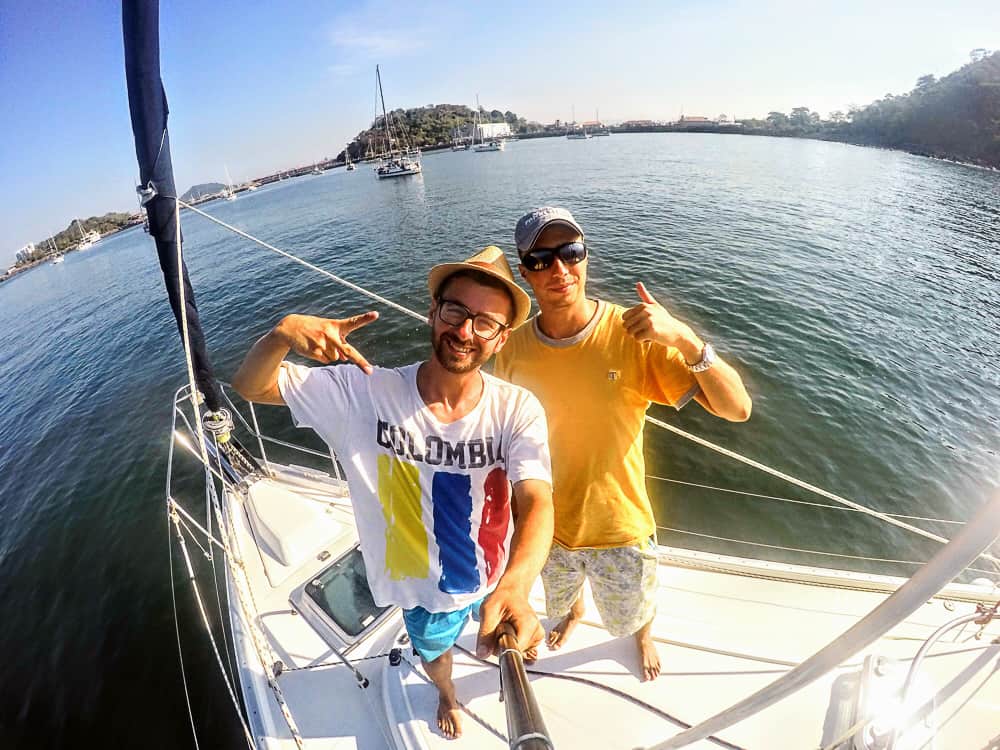
Sailboat hitchhiking is a popular and eco-friendly way to see the world, but how do you actually get started? We wanted to get the low down and caught up with two sailboat hitchhiking pros, Mariusz ‘Maniek’ Hońka (27) and Maciek ‘Termometr’ Badziak (27), who hitchhiked from Poland to Bora Bora, crossing the Atlantic and Pacific oceans.
How much sailing experience do I need to hitchhike on a sailboat?
“None,” Badziak said, though it makes it easier to find a boat if you do have experience. Hońka said, “I spent 2 weeks sailing as crew in Poland’s Mazurian Lakes district. I knew what a boat looked like, where the mast was, how sails look, etc”.
The guys explained that you don’t need super salty skills to become an ocean nomad. As sailboat hitchhiking involves traveling long distances in a small space with other crew members, good social skills are highly valued.
“Skippers and boat owners prioritize good people over good sailors,” the guys said,” The important attributes are a positive attitude and an open mind . Each skipper has different rules and so it’s also important to be flexible . However, any skill that you have can be to your advantage – mechanical knowledge, sailing experience or cooking skills are always welcome onboard .”

How do you find a sailboat to get on? Are there any websites or physical locations you’d recommend for finding a boat?
According to the guys, “The most popular crew websites to find a boat are: Find a Crew and Crewbay . You can also try on sailing forums, but in our opinion the best thing is to go to the marina and meet the sailors in person . It’s also very important is to print out a good poster/advertisement with a nice photo and information about you and post it in places where the skippers spend their free time .”
“I was sitting with a friend on a bench in Gibraltar drinking a beer,” Hońka said, “and two guys asked if I could help them with carrying supplies in exchange for a beer. One day later I was on a brand new delivery catamaran for a 5 day sailing trip. That was the first boat I hitchhiked.”
“Sailing vessels are not your only boat-hiking options ,” Badziak said, “In the Darien Gap in Panama, we were stuck in a small jungle village without any road connection. We went to a bakery where we met some people who turned out to be crew on a boat. A few minutes later we were signed up and going through clearance at the migration office. That’s how we got on a cargo ship for 5 days delivering supplies for Kuna tribes on the San Blas Islands.”
Top 5 tips for catching a ride on a sailboat
Here’s what the guys had to say:
- Be well-known in the marina – talk to as many people as possible . Be friendly even with people who can’t take you on a board.
- Prepare a good ‘CREW AVAILABLE’ poster
- Be patient! With a bit of luck you’ll find a boat on the first day but it can take a few months.
- Check sailing seasons . The probability of hitching a ride increases with the numbers of sailors going in your desired direction
- Prepare a list of boats that you have already asked so as not to disturb the same people with the same question. You won’t be able to remember the dozens of faces that you’re likely to meet in a single day.
What are the best/worst moments in boat-hiking?
“The worst is when you wait a lot in one place for a long time without any opportunities,” the guys said, “The best moment is when you get a message that you are welcome on board. You take your stuff and go for an adventure!”
The most surprising thing about sailboat hitchhiking?
“The most surprising thing was that you can get on a boat without any experience ,” the guys said.
How did you get the idea to go boat hiking?
“A few years ago I met a guy on a bus who had already crossed the ocean by boat hiking,” said Hońka, “From the beginning it sounded like a fairy tale. Over a couple of years I read more information about it, which encouraged me to go for it and ultimately the dream came true.”
“In Poland we have a big hitch and boat hikers community,” Badziak explained, “Most of them share their crazy stories on a special Facebook group. When I read for the first time that it’s possible to hitchhike a boat, I knew I had to try it.”
Tell me about your trip so far. Where did you start? Where are you going?
“The idea of our project is to hitchhike around the world without spending money on transportation and accommodation. We started separately in September 2015, however our tracks were very similar: Poland, Gibraltar (our first boat hiking experience), Canaries, Cape Verde and Brazil. After 6 months we met in Peru traveled around Latin America for a year. Then from Panama we hitchhiked a boat to New Caledonia. We are currently in Bora Bora having a great time.”
How can we follow your journey?
Our project: “Autostopem Dookoła Świata” (“Hitchhiking Around the World”) you can follow on:
Our website
Fiona McGlynn is an award-winning boating writer who created Waterborne as a place to learn about living aboard and traveling the world by sailboat. She has written for boating magazines including BoatUS, SAIL, Cruising World, and Good Old Boat. She’s also a contributing editor at Good Old Boat and BoatUS Magazine. In 2017, Fiona and her husband completed a 3-year, 13,000-mile voyage from Vancouver to Mexico to Australia on their 35-foot sailboat.
Sunday 6th of August 2017
haha thats me standing on the bow of the other boat in the first photo. I remember these boys, we were docked next to the boat they ended up getting a ride through the panama canal with. didnt get to talk to them much, seemed like good lads though. sketchy boat they ended up on, their skipper even crashed into our bow one morning trying to get out of the marina. they almost got away with my shoes as well, ended up trading one of our German crew for them haha. Nice post :)
Monday 7th of August 2017
Awesome story. Classic boat-hiking fare.
Terms and Conditions - Privacy Policy
Yachting World
- Digital Edition

Boat hitchhiking: How to sail around the world without owning a yacht
- Elaine Bunting
- November 12, 2020
Elaine Bunting gets tips from crew on how to hitch-hike your way around the oceans, and from skippers on how to take on extra hands

Sharing a boat, whether you’re crew going places or a skipper requiring extra hands, can be a worthwhile experience for all. Photo: Tor Johnson
As a boy, Darroch Tait always had his head in a book. He was fascinated by adventures and the discovery of new lands. In his early 30s he decided to quit his job as a teacher, buy a boat with his best friend and go sailing for a few years. He set off in his 35ft Trident Warrior Hitrapia in 2013 and cruised the Mediterranean , until Hitrapia was wrecked near Sagres after the mooring buoy he had tied up to snapped its chain.
Tait didn’t want to abandon his plan. So he decided to walk the dock and find a skipper who would take him on as crew. It led to him being crew for a transatlantic crossing and then sailing around the world in 2016. Today, over two years of sailing and three different yachts later, he has completed the circumnavigation, and written three books about his travels.
It has given him adventures to rival the most vivid of those childhood books. “Active volcanoes, catching a 100kg marlin, surfing monster waves, freediving with whale sharks, sailing through the midst of the humpback migration off the east coast of Brazil… these are just a few of the many highlights,” he says.

Darroch Tait crewed other people’s yachts for two years
Joining the village
When Karen Slater lost her job with the Fire Service after 21 years she decided to go sailing. She had no background in yachting and limited knowledge, but she spent two seasons crewing for a charter skipper in Greece before signing up online in 2018 to find a yacht to sail on round the world. She finished up crewing on four different yachts. “Young or old, it’s a fantastic experience,” she says.
Slater had a crew position for the World ARC in 2018, a rally that attracts – and needs – a group of travelling crew. Her experience illustrates that even careful plans often fall victim to events, so you must be prepared to hatch Plan B, C and even D. She initially set off from St Lucia with an American couple, but three days later was struck down with pneumonia and had to be taken off.
Slater rejoined the boat in the Marquesas Islands and sailed onwards to Vanuatu. Then, she jumped ship “with the say-so of the captains”, and continued to Australia on another boat on the rally. Next, she joined a Swiss skipper who had an injured crew.
Close to Mauritius, however, she was injured herself after being thrown across the cabin and concussed. She was evacuated, and again returned home, but rejoined the same boat in South Africa for the final legs across the South Atlantic and up to Grenada.
Rallies such as the World ARC provide lots of these opportunities and are a great way to form connections and build a reputation. The benefits lie in both directions: becoming part of the rally ‘village’ can offer lots of crewing opportunities, and when the unexpected happens to a skipper’s plans, the same community can supply an experienced helping hand for a leg or more.
Article continues below…

Boat hitching across the Atlantic: 10 tips for choosing the right boat
Suzanne Van Der Veeken is the author of Ocean Nomad: The Complete Atlantic Sailing Crew Guide, which she launched at…

Finding crew: How to hire the right help for your ocean crossing
Every November, hopeful crew gather in Las Palmas in the lead up to the Atlantic Rally for Cruisers (ARC). In…
How to get a ride
Time was when the only way to get a ride on a yacht was walking the dock, and many travellers still do that. But as with dating, crew searches have moved online, and if you have sailing experience to offer this is a better way to seek a boat or crew. Sites such as OceanCrewLink.com and crewseekers.net are great places to start.
As with online dating, however, don’t take owners at face value, and don’t expect them to do so with you – sailing has its fair share of bluffers and eccentrics. Karen Slater’s first ever cruising experience was with a solo sailor who turned out to be “a huge drinker” who made unsafe decisions at sea. “I think what he wanted was a sober driver and that was beyond my skills,” she says. She quit, never to make that mistake again.
“Talk to someone face to face, not just by email. Have a few conversations and get a tour of the boat if possible. They can list all the sailing experience in the world, but you need to know what that means,” says Slater. If you can have a few days sailing with someone beforehand, even better.

Karen Slater completed a World ARC on multiple boats
“Go with your gut feeling. You will be stuck in a very small and confined space for a long time, so I would always suggest spending as much time before setting off as possible to see if you get along,” says Tait.
“If you don’t like or trust the skipper on land, they will be a nightmare at sea. Never get on a yacht with a skipper who skimps on safety. Lifejackets , liferafts, flares etc must be serviced and in date. If they’re not, I wouldn’t trust the skipper – these are basic necessities for survival if it all goes wrong.”
American sailor Tina Crabtree has sailed around 20,000 miles on ten different boats with more than 50 crew mates in total. “With the exception of two people, everyone worked together and was a joy to sail with,” she says.
“My advice is safety first. I left one boat because I was not safe. Somehow before I joined I had failed to notice the chafed jib furling line and many other signs.”
Crabtree also advocates joining boats in races and rallies – in her case the PacCup and World ARC. “These boats have had to pass inspections in order to join the race and thus were very well maintained.”
Martin Booth and Helen Doody have also sailed round the world on different yachts taking part in a rally. He says: “Safety is important: 100%. Travelling in a rally means a huge amount as people doing it tend to have a goal in mind, have done the preparation and have a minimum level of safety. But not knowing the owner is a big factor and I don’t think you’d ever know the answers until you’d sailed with them for a few weeks.”

Martin Booth and Helen Doody sailed the world as a couple on five yachts
It is possible to find crew places as a couple, and Martin and Helen did just that. In 2015 they were invited by a friend who had bought a new 46ft catamaran to join a crew of four for a circumnavigation. They helped with the preparation and sailed as far as Fiji, but there the skipper’s plans changed and the voyage ended.
“By then we had met everyone on the rally and were asked to help another couple, and later other yachts asked us to help.” The couple completed their round the world voyage on four different yachts and then joined a fifth to sail across the Pacific once again.
In their experience, some skippers will prefer a couple. “It’s very circumstantial,” says Booth. “It depends on the owner and the existing crew, and us. A single owner or skipper with other individuals on board might be seeking a single person. A lot of retired couples like to have another couple. For us, being a couple is advantageous because you always have a buddy.”

The skipper’s rule is final: joining crew should fit into the boat’s routines. Photo: Tor Johnson
Who’s the boss?
While you need to be careful of an unknown skipper’s experience level, many problems actually arise with more experienced crew who think they can adopt an advisory or even ‘co-skipper’ role. This is particularly true of people who’ve been boat owners and skippers themselves.
“Your boat, your rules, is a useful motto,” says Tina Crabtree. “It’s startling how every boat is run so differently.”
“Crew should always keep in mind that they are guests aboard what is, in essence, somebody else’s floating home,” says Darroch Tait. “Many new skippers are quite insecure in their abilities and don’t take kindly to any sort of criticism.
“It is a very fine art of persuasion to try and get a skipper to make a sensible decision without hurting his ego. Sometimes on the circumnavigation, I got it right but sometimes I didn’t and left two boats as I’d lost faith in the owners’ ability to make the right choices.”
There are two ways of looking at this comment. As crew you have to accept that skippers have every right to run their boat in the way they please and that it is not a democracy. No one knows how to sail oceans until they’ve done it, and a skipper, too, is always learning along the way. It’s not a crew’s place to criticise, and pushing for unsolicited input – or, worse, giving feedback after the event – will not go well.
“You are living in someone else’s home and they have put in the time and money to it. Be respectful and open minded,” says Martin Booth.

It’s important to set clear expectations before the start of any voyage to avoid conflict. Photo: James Mitchell
“There can only be one person in charge,” Karen Slater says. “The skipper is the skipper under every circumstance. There is no perfect answer to how to do things, and if you are a skipper yourself, get on as crew. I always ask: ‘How do you do it here?’ After all, it’s always worked for them. You have to be able to accept that.”
When it goes wrong
There are some real horror stories about skippers and crew at sea, from minor differences that got out of hand to irreconcilable rifts. But most issues can be avoided if you set the right expectations.
“The problems we have seen along the way were people who haven’t presented themselves properly,” say Martin Booth and Helen Doody. “Just be you. An owner has got to like you, understand you, trust you. If you’re not honest then that dishonesty will always show.”
“You have to be adaptable and able to get on with people,” says Karen Slater, “And you have to be able to have frank conversations. I talk a lot, so I say that if you like quiet contemplation I’m not for you.”

When it goes well, lifelong friendships can be formed among crew who share an ocean passage. Photo: Tor Johnson
When a friend confessed her skipper was a bit of a bully, Karen admitted one of hers had shouted a lot too. “We talked about it. He used to shout at me things like: ‘Pull it, pull it! Hurry up!’ I’d say: ‘I have only got these arms and this strength and if that is any good to you that’s great, and if not I’ll get off at the next port.’ You have to nip that stuff very early on. You can’t treat me like that.
“I’ve heard horror stories of people frightened to come out of their cabin, and it’s not all male to female, it can be the other way round. You need to be tough and gritty but you don’t need to be aggressive. Be honest.”
She adds this important point about alcohol on board: “A good boat is a dry boat when underway. If nobody’s had a drink, you know who they are and have consistent behaviour. If people are predictable you only have the weather and the sea to worry about.”

Living in a confined space with strangers best suits tolerant personality types. Photo: Tor Johnson
Then there are lesser irritations that may chafe. “Don’t sweat the little stuff,” says Slater. “This is a skill you can develop. The more people you meet, the more you do it. I would put tolerance in huge capitals. If you have no tolerance of people maybe crewing is not for you.
“But if it’s really gnarly, you have to voice it. I shared a cabin with a guy who didn’t believe in deodorant and never washed his clothes or used the shower!”
Martin Booth says you need to be aware of anything that smacks of unfairness. “It can be things that get to you after two weeks at sea. If, say, you’re the one always doing the washing up or making lunch, it will begin to grind. They are not the things that ultimately will end it, but they will contribute to a crew not getting on.

Some owners welcome the practicality of having a couple join them for long passages. Photo: Tor Johnson
“No owner or crewmember wants a situation where someone is not wanted on board. Sometimes times are going to be hard, maybe there’s bad weather, and you all need to pull together.”
Counting the costs
The biggest bonus of crewing on someone’s boat is the cost, even though this can vary wildly. During their round the world trip, Tina Crabtree joined Dan and Em Bower on their 51ft charter yacht Skyelark of London (the authors of our Bluewater Sailing Techniques series).
Even paying a crew fee on a commercial charter yacht represents a considerable saving compared to taking your own boat. “Being a paying crewmember is a great way to cross oceans and cruise islands. Anyone familiar with the cost of marine hardware knows it’s a bargain,” she says.
“Owning and maintaining your own yacht is costly, however frugal you are,” adds owner-turned-crew Tait. “Crewing for other people removes this from your budget as you are generally only required to pay your portion of food, visas, sometimes mooring fees, etc.”

Domestic chores and food sharing can be a flashpoint. Photo: Tor Johnson
Tait says almost all skippers expect to pay the costs of running their boat but on a rally there might be per person crew fees (around £2,000 for a full circumnavigation) and other costs are commonly split, usually food, but sometimes also gas, fuel and sometimes even mooring fees.
“Sometimes skippers will pay for everything including meals out, but that’s not the norm. Most require your contribution,” says Tait. “Every owner is in a different financial situation. Some may need [a contribution] to make it happen. Some may want to create a line. Either way, there isn’t a right or wrong,” says Martin Booth. “It makes no difference so long as it’s clarified at the outset.”
Additional costs depend on how you want to live ashore. Tait says he spent just €250 a month while sailing in the Med, but €1,000-1,500 a month during his round-the-world trip. “It was cheap at sea but in French Polynesia you might want to go diving or stay in a hotel. This is a once in a lifetime trip. My reasoning was I may never get the chance to visit most of those places again. Experiences are what count in life.”

Crewing can offer unbeatable life experiences at relatively little cost. Photo: Tor Johnson
Martin Booth estimates that he and Helen spent around £20,000 as a couple sailing around the world, adding: “It is an absolute bargain. You couldn’t go on holiday to all the countries we visited for a tenth of that. But remember, you are on duty and on call 24/7.”
Sailing around the world is by no means a vacation in the conventional sense. Whether skipper or crew, long-distance sailing is almost a job. “Don’t approach it as a holiday. You are getting to see amazing things but it is a stage of life you are undertaking,” says Helen Doody. “You can’t be partying and not doing the jobs.”
Martin and Helen have now returned to work. “I think,” he says, “you learn from this how to cope with having a jobs list that never ends. In work you can be used to ticking things off and getting things completed, but on a boat you always have something on.”

Photo: Hugh Johnson
The Skipper’s perspective
Finding good crew, says Hugh Johnson candidly, is “a total crapshoot.” Johnson is a lifelong sailor who has sailed across the Atlantic himself as crew. He now owns an Oyster 625, which he has sailed in the Med, and across the Atlantic and Pacific to New Zealand. To help on the crossings, he and his wife have taken on ten different crew, mainly found through the Ocean Crew Link website.
Of those, he says: “Four were great.” The other six he wouldn’t let back on board. He recalls two who couldn’t cook (including a 40-something who only knew how to cook rice and one woman who spent the whole time sunbathing), a Frenchman who “contributed nothing but ate and drank as much as possible”.
There was a Scandinavian guy, and his girlfriend “[She was] a secret drinker, who hid whisky bottles in their cabin. The rows late at night coming out of that cabin were horrendous.” A couple who sailed with them and looked after the boat while ashore also turned sour. “They blew up the battery bank and that cost us NZ$27,000. The deck is completely ruined because he scrubbed the teak with the grain and we’ve had to repolish the galley where he blistered it.”
The four individuals who worked out well are still very good friends, and include one woman who joined in the Marquesas at the last minute who turned out to be “superb”.
“It doesn’t matter what qualifications you see in potential crew, you really have no idea who you are dealing with until you get them aboard, and even then you need time to watch them in practice. On the other hand you can get so lucky and find people who become lifelong friends,” he says.
One of the best crew came with a strong recommendation from another very experienced skipper, and Johnson would in future consider Oyster Yachts’s paid crew finding and vetting service. “The finder’s fee is equivalent to one week’s salary. But with hindsight, when we consider the value of damage, that is something I’d think about.” Among the worst aspects are people who don’t respect your treasured boat.
“When you build a boat, you invest a lot of love in it, and it hurts when things get damaged,” he says. Johnson’s advice? “Sometimes you get lucky, but expect it to fail. Don’t get cut up too badly when you put a lot of effort in and they are ungrateful. You have to be pretty thick-skinned. And if someone goes sour on you, take the first opportunity to put them off.”

The Rölker family own a Lagoon 380 called Kirlana
Borrow a boat
If you don’t have all the funds to buy a boat, or don’t want to use the capital, you may be able to lease a yacht on longer-term basis. The owners of Lagoon 380 Kirlana are offering just that in between their own sailing trips.
German special education teacher Kathrin Rölker and her husband Tom bought their 2001-built Lagoon 380 for €160,000 in 2019 and spent last year from July to December on board, mainly in the Balearics, with their two children, aged 10 and 12.
They had been planning their sabbatical for three years and are planning another in just under three years’ time. In the meantime, they are talking to friends and acquaintances who may be interested in borrowing the boat on a long-term basis.
“When we thought about how to get sailing on a catamaran we would have loved to charter one but it was expensive. In the end we bought this boat, but it took us one-and-a-half years to find it so we don’t want to sell it,” says Kathrin. “We’d love to see another family or couple take our boat and use it for several months. And if we rent it to someone we can invest the money.”
“They will need to take care of maintenance but not necessarily the costs so we’d have to find a way to deal with it. But it definitely makes sense, and anything up to two years would be OK. It would cover the finance for the boat and the maintenance, and we won’t have the storage and marina costs.” Other owners and some yards are also beginning to explore longer leases and part shares, and Dream Yacht Charter can offer season-long charters.
See Kathrin’s blog at dereigeneweg.net
First published in the November 2020 issue of Yachting World.

How to Find a Sailboat Ride? | Boat-hitchhiking Tips
You want to travel simple, sustainable and the adventurous way so you’ve decided to catch a sailboat ride! Awesome plan. Your life will never be the same ;) Sailing is not only for the rich and famous. Sailing can be done on a budget and without having a boat. I’ve boathitchhiked +/- 27.000 Nautical Miles in all sorts of boats and seas and learned a few things how and how not to do this. Here are some tips in the ride-finding journey.
How and where can you find a ride on a sailboat? Where to look on the internet? In which harbours can you find a sailboat ride? But first, what is this way of travel and how does sailboat hitchhiking work?

What is boat-hitchhiking? Sailboat hitchhiking is spontaneous amateur crewing on someone else’s sailing boat. It’s an alternative way of travel. It can be just for day, a few days, for a passage, or for sharing the lifestyle and chores on board. Some call it boathitchhiking, couchsailing, boathitching, or simply crewing!
What means being crew?
Crew is basically everyone on the boat except for the captain. Crew can be short-term but also be on board for years, living and/or working on board. As crew, you help to operate the boat.
Captains often want crew to make a trip more relaxed, fun, safe, and sometimes more affordable. Then, there are people out there, like you and I, aspiring to get a taste of the sailing life but don’t have a boat. Of course, you can book a sailing holiday. But to really get a taste of what it’s like to live on a sailing boat, sailboat ride hitchhiking is an alternative generally more adventurous and free-spirited way of travel.
How to start?
Be aware of the situation and what an adventure like this is all about. Have your ‘why’ clear so you can search accordingly. Do want to learn how to sail? Throw yourself in a dinghy. Do you want to experience the lifestyle? Then this blogpost will help you get started. Though there are common routes, sailboat ride hitchhiking isn’t simply going from A to B, like hitchhiking with a car or taking a ferry.
Sailboats deal with seasons, routes, weather, breakage, and all sorts of variables. You can’t ‘just’ find a boat going from Spain to Mexico in August. It’s not a common route, and August is in the midst of hurricane season. You have to be flexible with time and destination if you’re looking to catch a sailboat ride. You have to adjust your travel plans to the boat; you can’t have boats adapt to your travel plans. You’re entering someone’s home and you have to adapt, share your value and team up to make it a good experience for all.
So, on the dock, do you just put your thumb out, hold a sign saying a destination and wait for a sailing boat to pass by? If it were that easy, I wouldn’t have written a whole book about it. It is not a straightforward endeavour. The most common questions I receive is ‘how to find a boat.’ Here are some suggestions! Enjoy and let me know what has worked for you.
Where and how to find a sailboat ride?
The most common three methods to find a boat are through connection via internet platforms, personal contact at the harbour, or referrals from your network. There is no fixed “best” approach. It depends on what kind of experience you want. It depends on luck. And it depends on your efforts. In general, to increase the chances of finding a boat, throw out as many lines as possible to give yourself a better chance of catching something. Try different approaches.
Pro and cons
Your network
Boats usually look for crew in their network first. If they can’t find the skills or availability from people they know, they look further on the internet or in the harbour. You might already know some seafarers, or maybe some of your friends have sailors in their network. Spread the word about your mission but above all your value. Use the power of social media connections.
Ask your friends if they have any tips, links or connections. They may or may not, but they will keep you in mind if they hear or read about any possibilities. Jump on board the Ocean Nomads fleet and tap into the network of those who have gone before you and are already out there. Ocean Nomads aims to connect more of you to the sea and find epic ocean adventure opportunities! There are +70 vessels in the fleet welcoming fellow nomads on board!

Update: Upcoming winter 2022/2023 we organize an expedition around the Atlantic Ocean with Ocean Nomads.
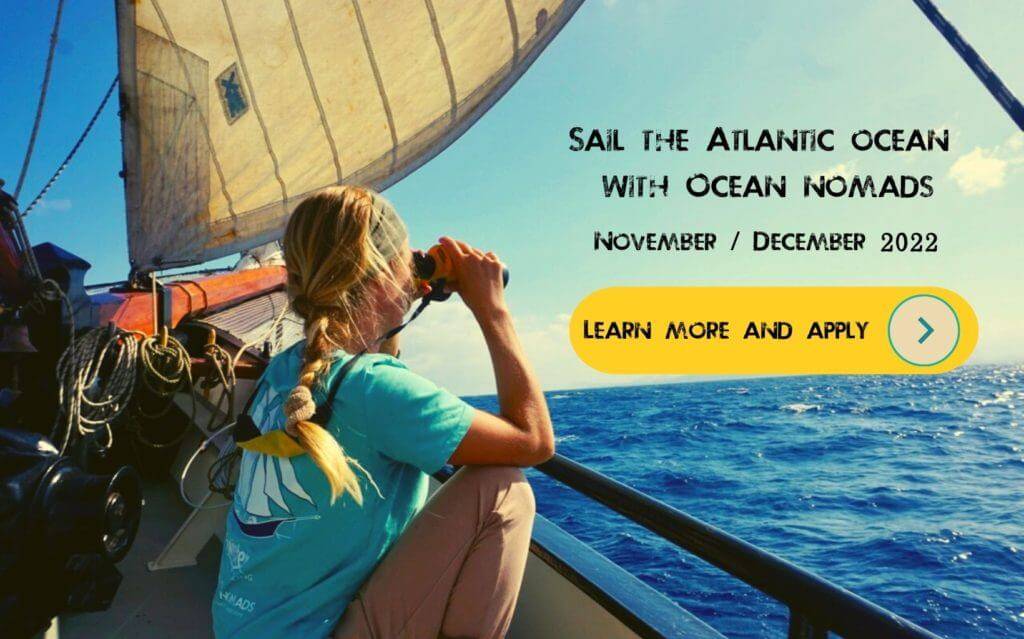
Crew websites
Today’s technology allows us to find out about crew positions and connect with captains all over the world. The internet has connected us more than ever. There are crew websites, sailing forums, and social media communities that can be helpful in your boat search.
Read blogs of sailors, captains, crew, and explore crew websites. It gives you a better idea of what boat hitchhiking is all about, who’s looking for crew, what kind of boats are out there, and what they are searching for.
Navigational Hazard! These platforms are set up with the right intentions. Though be aware that there are people out there misusing the platforms for other purposes than finding crew to help sail the boat. The internet is also a place for scams. You must be wary how, where, and with whom you connect and exchange personal details. Be especially cautious when:
- No profile photo of the captain is present
- Little information is given
- Only female crew is considered
- Your questions are not being answered
Let’s explore the platform possibilities of the world wide web.
Crew Websites
Some entrepreneurs have set up a website with the specific purpose to facilitate the matching of boats with potential crew and vice versa. There are numerous crew websites out there. They all have search engines and selection criteria to find a match, in both ways.
What is the best crew website? There is no ‘best’ crew website. Each one has their unique edge and differs in other aspects. Choose your favourite(s) and sign up!
- Ocean Nomads Community
CrewSeekers
OceanCrewLink
SailingNetworks
Crew websites in other languages
Netherlands: omtezeilen.nl
Germany: handgegenkoje.de
France: bourseauxequipiers.fr and vogavecmoi.com
Spain: genteparanavegar.com
SailConnect
Ocean Nomads
It’s also worth checking out discussion forums that often have threads on crew finding and how to find a sailboat ride.
Sailor forums
Popular English-speaking sailing forums:
Cruisersforum.com
Cruiserlog.com
SailingAnarchy.com
sailnet.com
Traveller forums
Couchsurfing.org is a travel community platform focused on hosting and staying at a place for free (or just sign up to find locals and like-minded travellers and go for a hike or coffee). The website can be helpful before and after being on a boat.
Couchsurfing also has discussion groups on destinations and travel styles, including sailing and crewing.
It’s also worth checking out sailing forums in your language.
Search on Facebook for crew related sailing groups. Dozens of them exist, and new ones keep popping up.
Atlantic Ocean Crew
Caribbean Sailing Crew
Pacific Sailing Crew
Mediterranean Sailing Crew
Cruising Opportunities Facebook Group
Sailboat HitchHikers & Crew Connection
Ocean Nomads
Which one to sign up for? Each captain has a different favourite crew platform. To increase chances of success as a boat seeker, you can choose to become a member of different platforms. This does mean extra efforts in engagement and profile updating from your side.
Do: Research credibility and trustworthiness of ‘crew wanted’ advertisements to make sure you’re not dealing with scams.
Don’t: Buy a plane ticket after one or two message exchanges on the internet. Find out to the best you can if the boat you found is a good match.
All these websites can be overwhelming. I’ve reached out to the crew websites’ management and reviewed noteworthy ones. An extensive review of crew websites and why or why not join and pay for them, and more about assessing safety and competency can be found in book Ocean Nomad .
You can meet captains and find boats by going dock walking . While you may have less potential boats around as opposed to the internet, walking the dock is a quicker way to analyze if there are suitable possibilities. Strolling around the harbours, or paddling around in bays and anchorages to find a crew spot, is definitely part of the fun. Here you’ll meet like-minded water-lusted people with a shared love for the ocean, with the same dreams, mindset and nomadic lifestyles.
Be curious and brave and wander around the dock to see what’s happening. Start a chat, make a friend and offer your help. The sailing lifestyle can be a lonely one, and most sailors are eager to have a chat and meet a new face. Perhaps you’ll get lucky and will be invited for a coffee.
Back in the days, before the internet, dock walking was basically the only way how boats found crew and how crew found a sailboat ride. Still, captains may look for crew at the last moment because previous arrangements did not work out. Or they realise after the passage to for example the Canary Islands that an extra crew member may be handy. Many captains are also aware that they can pick up crew on the dock. Make friends and success will follow.
How to find out about harbours and anchorages?
Paper Charts
Google Maps
www.noonsite.com
Navigation apps like Navionics
Anchorage apps like Navily
Be aware! Boat hitchhiking is not an adventure to be taken lightly. Finding a boat is one thing, finding the right boat, crew and captain match is what makes all the difference. There are some things to be mindful of. On a boat you live, work, eat, leisure together. It’s like camping in the wild with a bunch of strangers. Inform yourself, research and prepare. It’s part of the fun!
How to approach captains? How to stand out? What to put in your crew profile if you don’t have experience? What are captains looking for? How to figure out if a boat is safe and a captain is competent? What to watch out for as a solo female traveler? What are tips and tricks are there on how to find a sailboat ride? Read all about it and more in book Ocean Nomad . Do you have many questions? If you like my personal opinion or advice we can meet for a virtual coconut or you can ask me anything on one the ocean nomads trips .
I’m also working on a cheaper condensed version of the book focusing on the global boat hitchhiking topic. I hope to have it finished for you soon! Put yourself on the email list if you like to be notified when it’s ready.
Yes please! At the end, it’s the people who make the experience, and the purpose behind all it that make it worthwhile. So take your time finding the right sailboat ride. Enjoy the journey. And come and say hi in the Ocean Nomads tribe .

Hi! My name is Suzanne. I'm here to help you go on ocean adventures and make positive impact for a healthier ocean. Explore this website to learn what I do and how you can make some splashes too!
Previous Post What can you do? The 7 R's: Rethink and Recycle
Next post adventure & impact sailing opportunities for august and september | 2019, you may also like.

2023 nomad life highlights and 2024 adventures

Join the Club

My Nomad Gear & Tools

© 2024 Oceanpreneur. Suzanne van der Veeken. Registration: KVK 60416947 VAT: NL001950161B95
- Canary Islands
- Saint Lucia
- Saint Vincent and the Grenadines
- Sailboat Travel Tips
- Sail across the Atlantic
- Sailing & Sustainability
- Sailing Opportunities
- Travel By Sailboat as Crew: The Course.
- Slow Travel
- Natural Life
- Ethical Travel
- Zero Waste & DIY
- The 7 R’s: Rethink-Refuse-Reduce…
- Ocean Education
- What can you do?
- Tips on Selfpublishing a Book
- Conscious Gift Guide
- Work with me
- Buy me a Coconut
- Partners & Press
- Support Ocean Awareness & Action
- FAQ-sailboat-travel
How to Hitchhike a sailboat.
Catching a ride on a sailboat is one of the best ways to travel the world. No plane tickets to buy or fuel to burn. The rhythm of the sea experienced at a speed of Travel that is far more conducive to mankind then aeroplanes or automobiles.
Harness the energy of the wind and experience all the spaces between: the villages, cultures, and islands that don’t have access by road or airport. Cultures born of the sea. Coastlines without roads and a people who share a deep kinship with anyone who travels the open ocean.
But how to find a ride?
Most sailors follow yearly weather patterns which remain the same year in year out ad infinum. So to find a ride the most important thing is to be at the right place in the right time. Want to cross the Atlantic? Be in Gibraltar between October and December. Want to cross the pacific? Be in Panama City in April. (More comprehensive list at bottom of the page). Once you are in the right place, go to the marinas and talk to one of the old salts who has been drinking beer there for the last twenty years. He will know every boat, where it is going, when, and if they need crew.
Walk the docks with a smile and talk to people. Grab a kayak (ask first) and paddle around the boats in the anchorage at cocktail hour and ask if anyone is going where you want. You will probably find a ride or at least get a free glass of wine and some friendly conversation. Look for the free wifi spot in the area, this is where the sailors tend to congregate.
You can also make a small sign with your name, what languages you speak, and experience or mechanical ability. Also a bit about yourself, and that you do the dishes and are easy going. Which you should be if you want to sail the open ocean. Do that and it won’t take long if you are in the right season.
I had two friends in panama who found a ride for themselves, there two bikes and a live chicken, in less than a week of searching. (The chicken made the journey from Mexico to panama on the back of a bicycle and never laid an egg until they got to sea!!!)
Sailors hide from the hurricane seasons then return to those beautiful sailing grounds for a winter of cruising. Bring along enough money to feed yourself, and fly home, clothing to fit the voyage and foul weather gear. Make sure to spend time with the captain and boat before setting out. Ask around to others in the marina about the reputation of the vessel. Always discuss and if possible get in writing what is expected of you, what costs you will be sharing and what watches you will be required to do. Also what happens when you do reach an island. Some captains may expect you to stay with the boat at anchor while he or she goes and explores the magic place you just arrived in. This may not be what you are looking for . Costs usually range from shared food costs to ten or twenty dollars per day. Just make sure that everything is clear before setting sail and that the boat and captain are seaworthy. Your time and energy are valuable. Smile big and remember you don’t have to take the first vessel that offers.
400 offshore pleasure vessels cross the pacific every year. Most of them take a few crew to help with watch and give more sleep to the skipper. Many will welcome inexperienced crew if they are willing to listen and work. Some, including me, actually prefer teaching someone doesn’t know rather than trying to correct bad habits. If you don’t have any experience be proactive by learning to tie a bowline and getting some of the nautical terms in your head. As a final note, always say you are looking to crew a boat not hitchhike and don’t hesitate to change vessels if you don’t feel good, the great advantage of hitchhiking is that you are not tied to one ship. Try many and learn what you like and dislike about each boat and captain.
Fair winds. See you in the ocean.
Where to be when…
Gibraltar, malta, rhodes, piraeus.
October to December for crossing the Atlantic. April to June to head into the Mediterranean.
Canary Islands
October to January for crossing the Atlantic.
Antigua, Barbados, Virgin Islands and Puerto Rico:
October and November to cruise the Caribbean
anytime for either direction, april to cross the pacific.
Southern California
September to December for boats to Mexico.
January to March for boats to the South Pacific.
New Zealand
March to July for boats to Australia or anywhere in the South Pacific.
Miami, New York, southern England
September or October for boats to the Caribbean.
in August for boats back to the USA. More info about weather patterns on noonsite.com Crew positions on findacrew.net crewbay.com crewseekers.net
- https://www.facebook.com/awsc.ne/
- Alternative Travel, No-fly travel Guides about Alternative and No-fly travel – Car/Boat hitchhiking – Alternative accommodations
- Get ready for a long journey Equipment – Bank – Mobile Applications – Health
- Visas & border crossing Visas on the road – land and sea border crossings
- World Recipes Learnt recipes – Easy french recipes
- Travel Stories Our stories and yearly overview
- Thoughts on the go Our thoughts on travel topics
- Interviews Interviews of inspiring nomads
- Photos Gallery
- Video Productions
- Bosnia and Herzegovina
- North Italy
- Central Asia
- Turkmenistan
- South East Asia
- Philippines
Boat Hitchhiking guide: our tips to get onboard!
- 3 February 2020 14 June 2022
- Alternative Travel
Ahoy! Are you ready to set sail to explore new lands? Are you motivated enough to find a nice ship and a good captain to make a crossing, despite your lack of sea experience? Look no further! Our Boat Hitchhiking Guide was written to help you sail safely to new horizons!
Introduction
Definitions.
Before getting to the point, let’s start by defining what hitchhiking a boat is:
- Boat Hitchhiking : like hitchhiking, it means boarding a ship (cargo, sailboat, ferry, etc.) for free. There are two cases: either the captain did not initially plan to take on board another crew member, or either he needs help on board and is willing to take on a crew member without any financial contribution. The voyage plan is defined by the captain, and the crew member rarely has any say in the matter…
- Chartering : such as carpooling, boarding is scheduled in advance (planed departure) and costs are shared equally. In general, when it comes to chartering, all crew members without exception agree on the destination, stopovers, activities, etc.
In this guide, we will rather talk about the practice of hitchhiking a boat, in particular hitchhiking a sailboat and briefly the practice of hitchhiking a ferryboat, which are the two forms of hitchhiking that we had the opportunity to try during our adventure.
Why hitchhiking a boat?
There are a number of reasons why travellers choose to hitchhike a boat:
- To avoid flying or any mean of “conventional” transportation
- To limit our carbon footprint : by sailing, the crossing is done mainly thanks to the wind strength!
- To live an adventure and enjoy the adrenaline it brings: living confined in the open sea, for several days, facing storms, huge waves… It’s an experience in itself!
- To learn new skills , such as knowing how to tie sailor’s knots, steering, or sailing… and discovering a new passion?
For us, hitchhiking a boat was a huge challenge in our round-the-world hitchhiking journey: in order to be in line with our ecological convictions and to respect our challenge of a trip without airplanes, we had to cross the seas… And so to find a boat!
Good to know
Before taking the plunge, we strongly advise you to read up on the subject: books about navigation, videos/vlogs, forums, blogs, stories… Everything is worth to give you an idea of the crossing conditions, life on board, the stakes and the risks! In addition to avoiding unpleasant surprises, having some theoretical knowledge of navigation can compensate for your lack of experience and make a difference in your search for boats.
Sailing seasons
As a good start, find out about (good) sailing seasons: a good sailor will avoid taking the sea in the middle of a storm season, with headwinds or opposing currents!
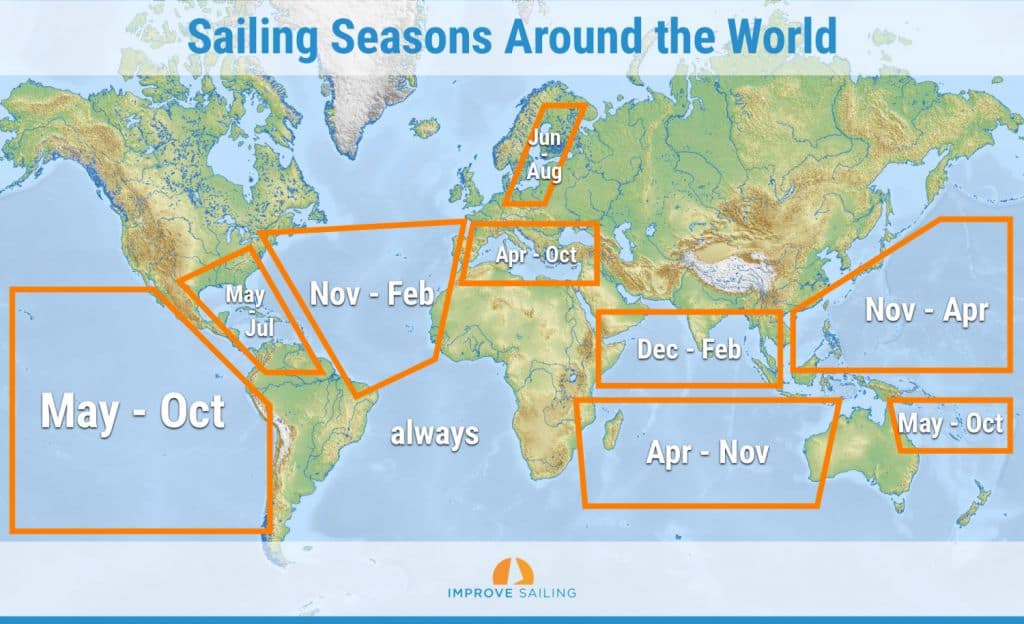
In addition to the indicative sailing seasons maps (which are not always very accurate!), a majority of sailors rely on the website Windy.com to evaluate the direction and strength of the winds at sea, as well as the wave heights for the upcoming days. Check regularly this website , in order to determine the next ideal sailing window!
Safety on board
We have to confess you something: while we were still novices, we went aboard a sailing boat for two weeks at sea, where the safety level was… almost nonexistent. If this experience gave us a few scares, it mainly taught us to be much more careful in term of safety !
The following is a non-exhaustive list of safety points to be checked before boarding a boat ( check the complete list here ):
- Liferaft: is there one? When was the last revision?
- Grab bags : where are they? Do they contain all the necessary items to survive at sea for several days (dehydrated food, water, knife, radio, distress flares, etc.)?
- Spares : are they new and/or in line with regulations?
- Extinguishers : where are they?
- Life jackets and jacklines: are all members equipped with a lifejacket and harness? Is the deck of the boat equipped with a lifeline? Is there a demonstration plus a fitting session for life jackets before departure?
- First aid kit : where is it? Are medicines and bandages still usable?
- Dinghy: is there one?
Is the engine running well? What is its power? Is it properly maintained, overhauled? Have the filters been changed recently? Are there replacement filters on board? What is the capacity of the fuel tank?
How does the electrical system work? Are the batteries new, can they be fully charged? Are there complementary systems to provide energy on board (solar panels, wind turbine, generator)? Are there spare batteries?
Is there an autopilot and does it work properly? Are there on-board means to replace the GPS in case of a problem, such as compass and paper maps?
Make sure the boat is in good condition, as well as all cables, sheets and other items on deck!
Are the sails maintained? Is there a set of patches and needles available on board to repair them? Does the boat have special sails for storms?
In an emergency situation, it must be possible to contact emergency services other than by VHF radio. There are a number of satellite tracking and/or communication devices that every vessel must have in the event of a crossing:
- EPIRB (ou emergency position-indicating radiobeacon), used as an emergency beacon in case of emergency.
- Garmin InReach® or InmarSat® among others, satellite communication devices (with subscription) that allow an SOS to be sent at any time.
Make sure that these devices are working properly, and are fully charged or have new batteries.
Are all water pumps working (especially the bilge pump)? Is there a hand pump in case of problems to pump water out of the boat?
Even if most of captains we met like to enjoy a little drink now and then (in fact, you often find them in the bars around a marina!), the use of alcohol and drugs on board could be problematic … Make sure in advance of everyone’s drinking habits, and don’t hesitate to refuse to board if the crew’s behaviour seems suspicious to you..
Is your captain aware about dangerous and to-be-avoided areas regarding acts of piracy? Did you check the latest updates on specific websites such as Noonsite or ICC ?
Costs sharing
Some captains ask, in addition to the tasks required on board, a more or less inflated financial contribution on board – some fees that usually include food, marinas costs, fuel and gas costs. This is what we call chartering, and as explained in the introduction, all costs are shared equally among the crew. You can find online ads where captains ask for a financial participation… up to 50$/day! At this price, it’s no longer chartering but a luxury cruise (where the captain makes a decent profit)…
Talking about costs on board is a very important topic which has to be discussed very early to not to be fooled. Considering that we give our time and energy to help the crossing (night watches between 1am and 4am, meals cooking, navigational assistance etc) and especially that we hitchhike boats and are not chartering, we feel that our financial participation must be limited to our food expenses at the maximum . Thus, we aim our research to captains making crossings for themselves or on behalf of an individual (deliveries) and not the ones ready to fill their boat (and bank accounts!).
Furthermore, we noticed taht the way to sail depends on captain’s habits (e.g. engine use or true sailing, stops at marinas or anchoring in bays, etc). We do not wish to pay for fuel or marina fees, knowing that we prefer to sail as much as possible and anchor off islands to explore them.
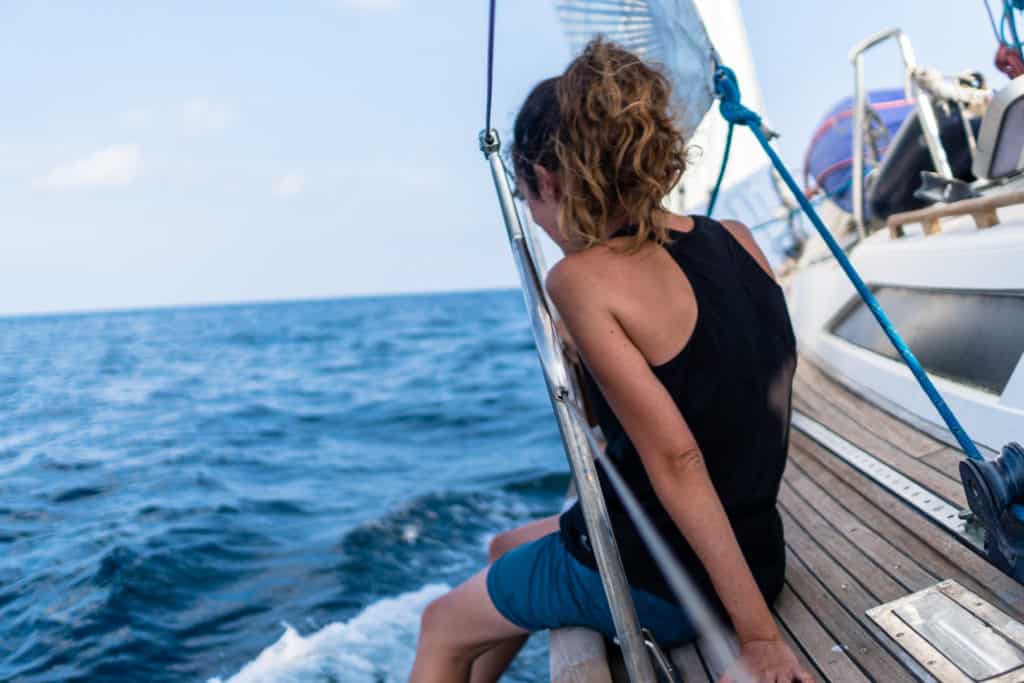
Skills required on board
Night watches.
Night watch or night shift is a period of time during the night when a crew member is assigned to stay in the cockpit, to provide a constant supervision . This allows other crewmembers to sleep, while ensuring that the boat does not risk collision (mainly with cargo ships and fishing boats) while staying on course.
No special knowledge is required to keep a night watch: the horizon is monitored with binoculars; movements of other vessels are anticipated by AIS (Automatic Identification System, a system that allows each vessel to locate vessels in its area), radar, navigation lights… And in case of problem or doubt, crew member should not hesitate to wake up the captain (and possibly the rest of the crew).
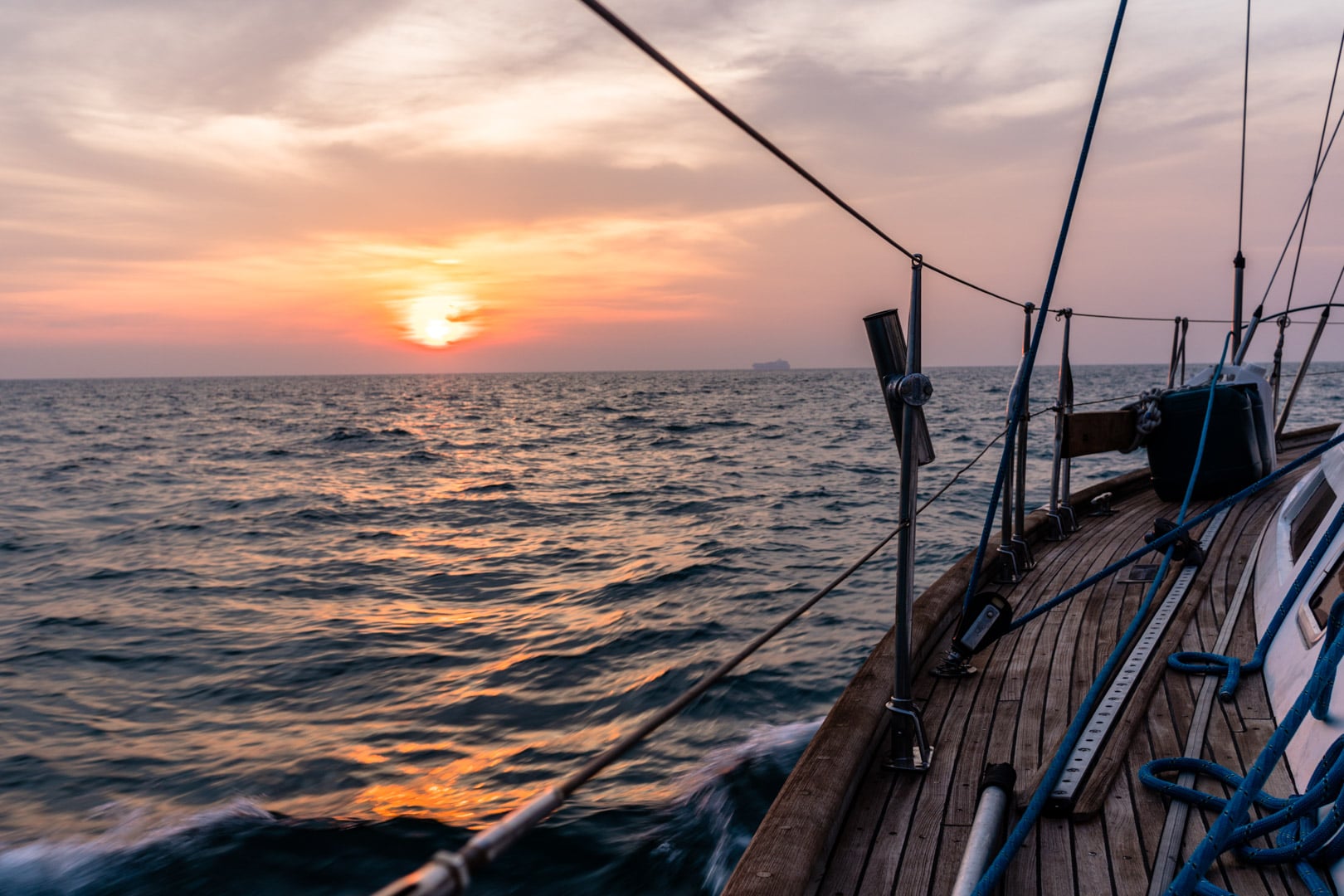
More about our first hitchsailing experience
Provisioning.
A useful skill on board is the ability to manage groceries and all menus according to one’s diet. Products type to be purchased will essentially depend on the duration of the crossing. . Provisioning is typically managed as follows:
- First week: fresh products as fruits/veggies, meat, eggs
- Second week: frozn meat/fish, fruits/veggies that can be stored longer (such as potatoes, pumpkin, etc.)
- Third week and more: rice, pasta, and food cans
In any case, it is better to leave a port with at least twice as much as necessary and a large stock of cans and dried fruits (in the event of inability to cook on board, such as storms, ship abandonment, etc.)
Knowing several recipes is a plus: crew will eat a more varied and balanced diet, and stay in shape for the rest of the trip! If you’re in need of inspiration, don’t hesitate to check our World recipes to impress the rest of the crew!
If the boat doesn’t have a functional oven, have fun testing our bread / pizza pan recipe:
- Mix flour, baking powder and a pinch of salt with a little oil or butter with your fingers until you obtain a granular flour texture
- Gradually add water, and knead by hand (add a little flour if the dough gets sticky)
- For pizza ; spread the dough thinly, cook it on one side and flip it over. Add tomato paste along with your pre-cooked ingredients (onions, peppers, mushrooms, grated cheese, etc.) and cook the other side
- For bread ; spread the dough to the pan’s size, and cook it on each side
Maintenance jobs
A boat is like a house, only worse: it requires constant maintenance and technical knowledge to deal with any problems on the open sea. People with knowledge in mechanics, electricity, and/or plumbing are more sought after! Similarly, crew members ready to sand, varnish or paint wood are generally welcome on board.
Entertaining
Days and evenings can be long and difficult, which is why it’s often enjoyable to get a crew able to entertain the rest of the crew through conversation, card games or role-playing…
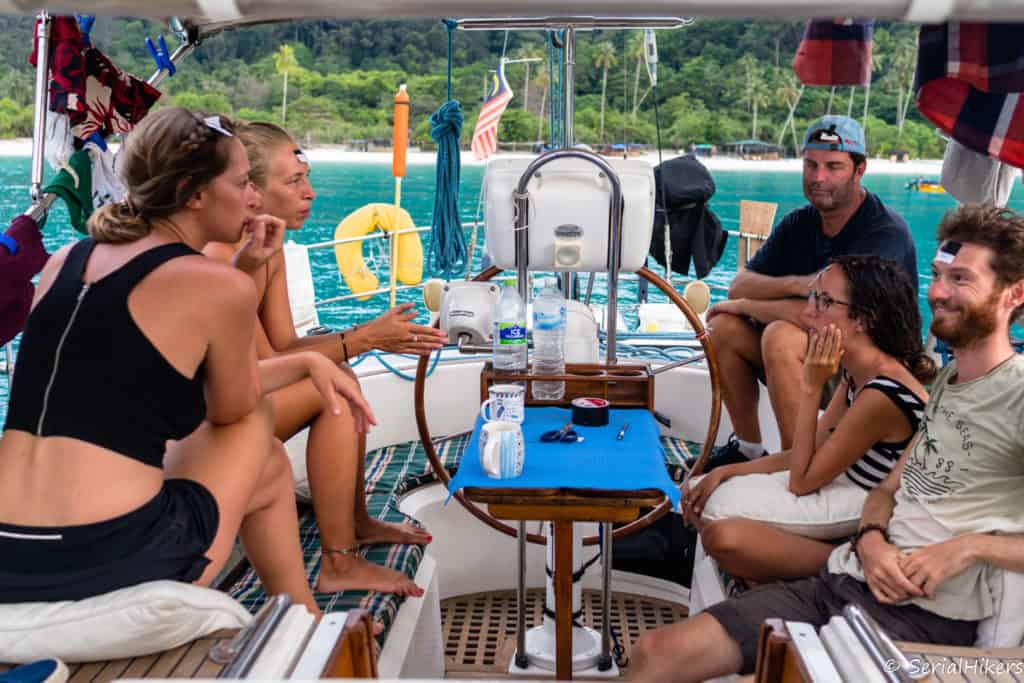
Looking for a boat
Online research.
In the digital age, websites to look for a boat online hasve multiplied. Some of them require to pay, others are aimed to French-speaking people… To multiply your chances, it will be wise to combine a regular search on different websites with an active direct search . Here is a (non-exhaustive) list of the websites we know:
– Crewbay – Crewseekers – Findacrew (paid website) – Sailing networks – Sailing cruisers forum (forum)
– Sail the world / Bourse aux équipiers (site et forum) – Vogavecmoi
– Sailboat Hitchhikers and Crew Connection – Sailboat Crewfinder Worldwide – Sailboat owners find a crew – Find crew be crew – Bourse aux équipiers (french speakers group)
Direct search, in marinas
Although that our online searches have been more successful than our direct searches, looking directly for a boat in marinas has enabled us to make ourselves known and expand our network .
- First, find out marinas and yacht clubs by doing an online research (key words: marina, yachtclub and the country name). Another way of locating anchorage points or marinas is to use vessels GPS coordinates on a map updated in real time, such as Vesselfinder .
- Go directly on the spot and speak about your project to the sailors you meet . Leave them your contact details, in case they consider a crossing or hear about a captain looking for crew members.
- Post your resume (CV) to the key points : club/sailing office, laundry room, lobby, sailor’s bar… Be careful, competition can be fierce and you’re going to have to stand out!
While crewmembers with little sailing experience have a better chance to find a boat, it’s not uncommon for captains to accept a motivated novice crew on board . Whether handmade or printed, your CV should stand out by attracting attention, while being clear and concise. Here is a few tips:
- Colorful title, short and straight – such as “Sailing to…?”
- Photo of you – rather taken outside, in a fun and relaxed atmosphere
- Short introduction of you (name, age and nationality)
- Text explaining your motivations, by emphasizing your interest in navigation and life aboard
- spoken language(s)
- travel insurance
- good swimmer
- other skills : first aid, good cook, maintenance skills (electricity, plumber), entertainment, etc.
- be ready to live in very minimalistic conditions : rational and minimal use of fresh water and electricity on board (quick shower, or on deck in case of heavy rain, salt-water washing up), living together in a confined space for several days, …
- Contact infos (phone, whatsapp, Facebook, email, etc)
Patience and perseverance
Even when all the conditions seem favourable to us, there may be no opportunities for days, weeks or even months. In Hong Kong, we waited 6 months before boarding another sailboat! We really advise you to be prepared for a (more or less) long wait, by looking for a place to stay (wild camping near the marina, volunteering missions, or free accommodation on a moored boat in exchange for services as we did in Hong Kong). Give regularly update to all your sailors contacts , rely on word-of-mouth work , check online opportunities … Patience and perseverance always pays off at the end!
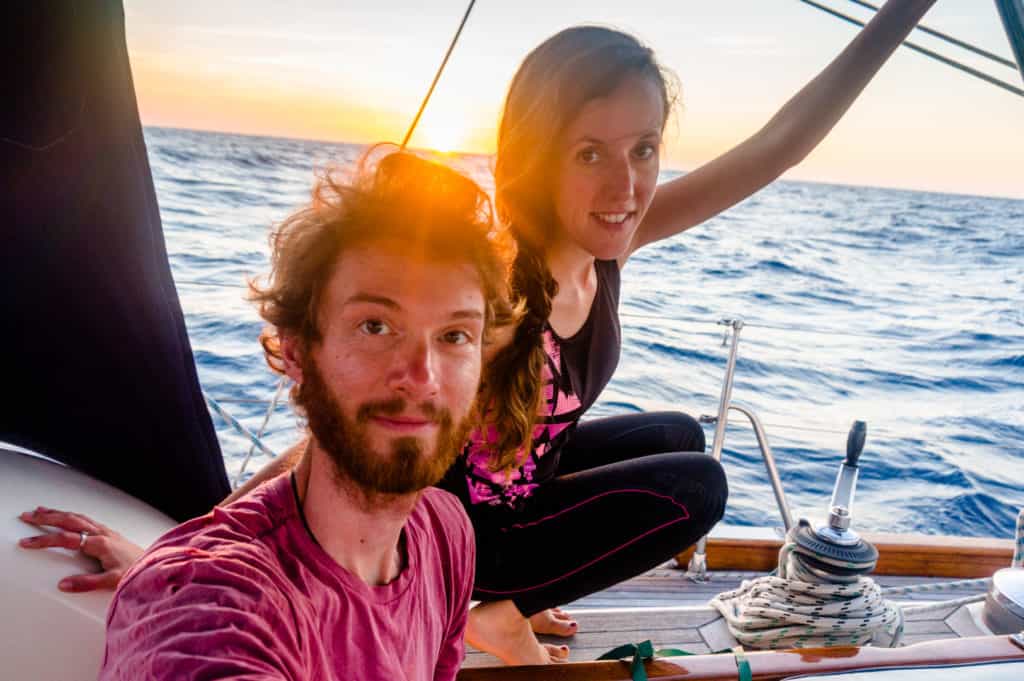
Before leaving…
Be prepared for the sea sickness.
Every crew member, even an experienced one, can be prone to seasickness. Before each crossing, make sure to take enough medicine for seasickness (or natural, ginger-based remedies). If symptoms of seasickness occur, lie down outside in the cockpit.
Take warm clothes and waterproof bags
When you take the sea, it’s always better to take some warm clothes (it’s always cooler at night), and waterproof . It is also necessary to take at least one spare outfit in case you’re getting wet. Take also a waterproof bag , or alternatively, store your important papers and electronic devices in freezer bags (like ziploc®). And, if you have closed, waterproof and lightweight shoes then wear them. If you don’t have any, don’t worry: we’re doing fine without!
Find out about visas
Of course, if a visa is required to enter the destination country, then you will need to take all the necessary steps before departure . It will also be necessary, the day or the day before departure, to go to the Immigration offices to get your passport stamped before you leave the country. Usually, each port has an Immigration Office – if it’s not the case, then you will be invited to go to the nearest airport to do so.
Hitchhiking a ferryboat in practice
How does it work.
In practice, there are two main scenarios:
- Hitchhiking a car/truck making the crossing : either by hitchhiking a truck (in some cases, lorry drivers have two tickets even if they are driving alone, and can offer the second ticket to a passenger who requests it); or by hitchhiking a car, before the car is loaded onto the ferry. However, hitchhiking a car is still very rarely possible, as most ferry companies require a passenger ticket (booked in advance) when boarding – often nominative tickets for each passenger in the vehicle.
- The ferry company offers free tickets to passengers who request them, often in exchange for a service (promotional photos or video, partnership on social medias…).
This is the second case that happened to us during our trip!
How to approach ferry companies
Before approaching ferry companies, we look for informations about the existing connections (names of the operating companies, ferry schedules, fares, etc.) and whether hitchhiking a vehicle before boarding is possible, or not.
After getting to know the names of the operating ferryboat companies, we contact them – with priority being given to contact directly marketing directors and managers , so that our request would have a better chance of success. We explained them our story, our travel objectives – while listing our skills, and offering our help in exchange. If your travel project appeals to them as well as ours did, and/or they are interested in a service exchange, the ferry company (via their marketing department) will offer you the ticket for the crossing of your choice. Don’t forget to honour your part of the contract, in case of a partnership!
Useful link:
* Post written according to our personal experience *
Leave a Reply Cancel reply
Your email address will not be published. Required fields are marked *
I have read and accepted the Privacy Policy *
Do you want to receive our last news by email? (maximum 1/month) yes no
Hitchhiking a boat
There's always the option of taking the sea route between two places. People have taken advantage of the seas for as long a time as civilizations have existed. Hitchhiking a boat can be a great way to visit places you never would have visted otherwise (especially without an expensive and extremely pollutant plane trip), and to experience both the romance and the harsh realities of traveling by sea. Getting rides on boats is much different from sticking your thumb out on the highway - it's less spontaneous and usually involves shared monetary costs - but many hitchhikers will still find it a rewarding and worthwhile method of transportation.
- 1.1 Important Differences from Land Hitchhiking
- 1.2.1 Communications
- 1.2.2 Safety Strategies
- 1.3.1 Attitude and Personality
- 1.3.2 Money
- 1.3.3 Abilities and Knowledge
- 1.3.4 What You Carry
- 1.3.5 Lifestyle
- 1.4.1 In Person
- 1.4.2 By Radio
- 1.4.3.1 Dedicated Websites
- 1.4.3.2 Facebook Groups
- 1.4.3.3 Old-fashioned Listings
- 1.5.1.1 East-West from Europe
- 1.5.1.2 East-West from Africa
- 1.5.2 Pacific Crossing
- 1.5.3 Caribbean Island-Hopping
- 1.6 Experiences
- 1.7 Weblinks with information
- 1.8 Blogs and stories
- 1.10 Resources for sailing
- 2.1 Hitching a ferry
- 2.2 Hitching a cargo ship
- 2.3 Hitching a fishing boat
- 2.4 Hitching a Barge
Hitchhiking a Sailboat or Yacht
Hitchhiking a sailboat or yacht can be quite an endeavor for some, but can be done with the right amount of persistence and flexibility. It generally means finding sail boats that need an extra hand on deck, and becoming part of their crew. With boats, the procedure of hitching is not so much about finding someone going to your destination, but more about finding the right boat and/or captain for you. In general, a lot of captains are ready to take persons (crew members) on their boat to aid with watch keeping, general tasks, or just purely for company.
Some sailboats are the only home of someone living on a tight budget, while others are owned by people from affluent backgrounds who want to sail recreationally with their friends. Often their friends think it is a good idea and agree to come along and then find out that sailing is not their cup of tea (too dirty, bumpy, boring, cramped - any number of reasons). Or maybe a captain needs to more help to operate the sails for a big trip they're planning, and doesn't know enough people who want to help, or has had a crewmember drop out for personal or family reasons. Thus crews are constantly and unexpectedly reforming. This is your opportunity for a ride.
Important Differences from Land Hitchhiking
Be aware of the huge and important differences between hitchhiking a boat and hitchhiking a car. Unless you've been invited aboard a rich person's superyacht, you will almost always be expected to help out with various kinds of work on a boat, and you will usually also be asked to pay your share of food and maybe other expenses too (see "Requirements" below). Getting on a stranger's boat is also much bigger commitment than hopping in a car, for both you and for the captain - if you're a week's sail out into the open ocean (or even an hour off the coast), getting out of the vehicle on short notice is not an option.
To make sure you don't come off as naive and entitled to boat captains, first read this article about boat hitchhiking from a cynical captain's point of view. But don't get discouraged: Next, start following a Facebook group like this one and watch some captains agreeing and others disagreeing with his attitude. The take-home message is that there are almost as many types of captains as regular people, and nothing is impossible, as long you're prepared to approach the world of boats with a hard-working and humble attitude.
There are lots of good captains out there, with good intentions. But the high seas can also be a getaway for the unscrupulous, or a refuge for people with attitudes that don't play well in polite society. Just like with car hitchhiking, the odds are vanishingly small that you'll end up with a psychopathic murderer, but unlike car hitchhiking, you have basically zero options to escape once you're out at sea. And there are many other things that can go wrong - so it makes sense to be more careful than you usually would be.
Also like car hitchhiking, the biggest danger is probably careless captains. An otherwise well-meaning captain who doesn't care about safety protocols, doesn't stock safety equipment, or doesn't take good care of his boat can be just as dangerous as as a bad-intentioned captain. Once you're on a sinking boat in the middle of the ocean, fallen overboard at night while the rest of the crew is asleep and the boat sails on without you, or seriously injured our sick and days away from medical help, it won't matter how well-intentioned the captain is. Luckily most captains want to protect their own skins too, and will have thought of all these things already, but it still pays to be aware of the exceptions. And of course, make sure you pay close attention and follow all safety instructions that the captain does give you. They're trying to protect you from dangers that you may not even realize exist yet.
Communications
Once you're a few dozen miles from shore you'll have no cell phone reception, you're much to0 far from land to swim back, and it's unlikely there will be any other boats near enough to notice you need help without a call from the ship's radio. On long passages, there might not even be ships in radio range - you could go a week or more without even seening another boat. Boats at sea almost never have onboard internet access, except sometimes an option to send short emails or text messages through a satellite phone (which is likely controlled by the captain).
Safety Strategies
So how do you go about taking safety precautions? Well, if possible start by analyzing how well the captain cares for their crew. Or their boat. How prudent they are about security. What kind of personal imbalance they might be experiencing based on their insistence on getting certain types of crew (like young, good-looking women). If you've met them at a marina or pub, ask other locals what they think of them. If you've found them online, check if they have any reviews from other hitchhikers or sailors (they generally won't anyway, but it's worthwhile to check just in case).
One safety benefit over car hitchhiking is that with a boat, it's easier to share the boat and captain's identifying information with a friend or family member before you leave. Boats have their names and often registration numbers painted on the side, and you'll have plenty of time to get the captain's full name and any other details you might want. Your family and friends might even be able to track your GPS position throughout the trip - most larger boats (and some smaller ones) have a system called AIS that regularly reports their GPS position to a public server so anyone can look up their current location on a map online. And captains who don't have this might still have another method, like a Garmin GPS system that reports back to a password-protected website. Others might have nothing.
You can, of course, bring your own safety equipment - life jacket, harness, even your own GPS/satellite phone (Garmin has good devices for a few hundred dollars plus around $50-100 per month for a satellite communications subscription). But check what the captain already is providing before you go out and spend a lot of money.
Also be aware of weather-related hazards. It's the captain's responsibility to avoid sailing into a dangerous storm (another reason to choose the captain wisely), but you may be held responsible for your own personal preparations. On a boat you're more exposed to rain, wind, sun, and cold than you would be in a house or even a car. Most boats have an indoor or covered area, but you may not have access to it for long hours of the day and night that you're standing watch or otherwise working on deck. In other words, make sure to bring a rain jacket, warm clothes, a sun hat, and sunscreen. Expect conditions at sea to sometimes be much colder than on land, and possibly sometimes hotter as well.
Requirements and Useful Skills
Different captains have different requirements, and different personalities. Above all, be helpful and interested in their trade. Even if you do not have any experience in sailing, be honest with the fact and state that you are eager to learn. Show respect towards their skills, their boat and the seas and the elements of nature. Learn about sailing, the races, the seasons and major routes. Be willing to help for work needed before the departure, like cleaning the hull.
Here's an overview of things you may need, though you can always find exceptions, and you'll rarely be expected to meet all of these requirements:
Attitude and Personality
- Positivity and humility : No captain wants to give a ride to someone who will be complaining the whole time, acts entitled, or thinks they know better about everything. You have much to learn, young grasshopper.
- Can-do attitude : There's a lot of work to be done on a boat, and the captain knows better than you about how things work at sea. Enthusiastically follow instructions first, and ask questions later. Be ready to work hard, including on unusual schedules.
- Patience and flexibility : Unless you're on a super-nice boat, life aboard is sometimes surprisingly simple, austere, and even difficult. Be prepared to endure hardship and find your inner peace, especially if you'll be at sea for more than a few days.
- Interest in sailing : Captains are generally much more enthusiastic about taking on people who want to learn about sailing than people who are just trying to get from point A to point B. Cruising the seas is their passion and hobby, and they want to share it with like-minded people. Presenting yourself only as a "hitchhiker" can be a way to get a quick "no".
- Chipping in : Unless you're very experienced and applying for a paid job, or have made friends with a well-to-do yacht owner, expect to be asked to chip in for your share of food, and possibly other expenses as well, such as fuel, cruising fees (charged by national governments for bringing a boat into their territory), or even maintenance. It's likely you'll be expected to cover your own visa fee for any country you enter (if any), which is usually similar to whatever you'd pay if arriving on your own by plane or land border. Talk about all these things with the captain in advance. A total of US$15-30 per day is considered a good deal, and $50 or even more is not unheard of (may depend on the region of the world). During the ARC regatta you can even expect boats ask as much as €50 per day since inscription fees are pretty high. An Atlantic crossing takes between 15 to 25 days, depending on boat and winds, so for example you'd likely need US$300-500 for the crossing alone - count on at least a week of land expenses in the marina till you find your lift, too. This may sound like a lot of money, but remember that you won't have any other expenses while at sea (except any monthly bills), so compare it to what you would normally spend over that number of days.
- Higher rates : Some boats will ask for much higher daily contributions, up to hundreds of dollars per day. Some will even insist that it's only your share of the costs. They're not necessarily trying to rip you off - they may just be trying to cover all their costs (maintenance, repairs, registration fees, insurance, etc.), and could genuinely be offering a unique opportunity depending on where they're going. But don't let them convince you that this is your only option for getting sailing experience - it's absolutely not.
- Getting a free ride : It is possible to get an entirely free lift food included, mostly on bigger yachts where you'll be needed to scrub the deck and polish the silver railing. But in general, don't expect to have all your costs paid by the captain just because you're working, unless (1) you are experienced and (2) the captain is running a business or otherwise seems to have a lot of money to spend. Remember that, unlike with land hitchhiking, an absolutely free ride on a boat means that the captain is buying you days or weeks' worth of food. Still, you never know - there are generous people out there. Just don't be demanding or act entitled, and maybe you'll be pleasantly surprised.
Abilities and Knowledge
- Ability to swim : Not always required - some captains supposedly can't even swim - but generally useful, and honestly pretty critical for your own safety.
- Knowledge about sailing : Most captains prefer a total noob to a know-it-all, but it doesn't hurt to learn a little bit about sailing in advance. Useful knowledge and skills incldude tying knots (specific ones used on boats), international collision regulations or "COLREGS" ("rules of the road" for how to avoid crashing into other boats), understanding of how to interpret ship lights, ability to understand the symbols on a navigational chart, knowing how to go fishing and clean fish, etc.
- Tolerance to seasickness : Most people get motionsick on a boat in rough weather, and some even in calm weather. But often the body gets used to it after a couple of hours or days. A few find out they can't just take it and must break off their trip. It's important that you find out how you deal with seasickness (and eventually find your own tricks to cope with it), and let the captain know it. The best cure is usually to stay above deck and watch the horizon, or to lay down flat in your bunk. Running to the toilet is strongly discouraged - it's cleaner and less smelly to vomit into the ocean, and you won't risk clogging the toilet either. On catamarans (double-hulled boats) you will likely experience less symptoms of seasickness than on monohull sailing boat (which is designed to rock back and forth without tipping over). There are drugs to cure some symptoms, or some people use ginger. Better pack some in advance especially in case you're planning a longer cruise and you don't yet know your reaction to exposure. Seasickness is no fun at all and can actually be dangerous for yourself and annoying for the rest of the crew, since you wont be able to fulfill any tasks below deck.
- Physical fitness : Most work on a boat includes some physical effort, and even walking around may take some extra energy and good balance when the boat is rocking back and forth. There's no need to be super-buff, but captains will generally expect you to be reasonably in-shape.
- Cooking : Being a good cook isn't a free ticket to a life on the seas, but it often helps a little. Many captains either prefer not to cook themselves, or like themeselves and the crew to take turns cooking meals. If you can't cook at all, you better be enthusiastic about washing the dishes.
- Sailing experience : Experience in sailing is often not necessary - many captains will tell you it's easy to teach someone to sail if they have the right attitude. But the more experience you get, the more doors will open to you.
- Language : Obviously all foreign languages can help, but for the Atlantic crossing speaking at least some French can make a huge difference, since over 60% of sailors on this route are French-speakers. French is also useful in the Caribbean and parts of the South Pacific, and many recreational sailors are French, so that may be the next most useful worldwide sailing language after English. Local languages in the countries where you're making port will also be highly valued, of course.
- Technical know-how : Rarely required, but captains love people who know how to help fix, maintain, or upgrade the boat: diesel engine mechanics, carpenters, electricians, etc.
- Medical qualifications : Also not a requirement, but who wouldn't love to have a doctor or nurse aboard their boat just in case?
What You Carry
- Pack light : There's usually very little storage space on a boat, after fitting in necessary equipment, stocks of food, and other supplies. You may even be asked to store all your luggage in your bunk with you. A backpack should be okay, especially if it's not the biggest kind, but you may have a hard time finding a boat that will let you bring a large musical instrument or a bicycle, for example (even on top of the boat there's not much extra space, and a bicycle not security packed up will quickly rust).
- Passport or ID , even when you're just travelling within Europe! The skipper must be able to provide identification documents for all crew members. Entering a country by boat requires passport checks and (often) visas just like entering any other way, though the details of the procedure may be different (don't be surprised if you have to give your passport to the captain so he can take it to the immigration and customs people).
- Equipment : Head lamp (ideally with a red light option). Waterproof boots and good shoes are recommended, though some boats may provide them and others may ask you go barefoot anyway. All-weather clothing and sun screen. Ask the captain for a list of what to bring - some things may be provided already, and other things may be specific to that boat. If you do need to buy equipment for an Atlantic crossing, the Canary Islands are cheaper when compared with mainland Europe and in Gibraltar for example. Apparently there are sailor’s “jumble sales” so you might pay less.
- Presentation : How you look and dress may or may not matter, depending on the captain. Many captains are conservative or old-fashioned sailor-men types, who may scorn "hippies", punks, etc. Some will be concerned that customs will give them a hard time about you when entering the destination country - if you get turned away at the border, or caught with illegal substances, it may be considered the captain's responsibility. On the other hand, some captains are hippies themselves, so never say never.
- Diet : Your diet may need to be compatible with the captains. If you're vegetarian or vegan, many carnivorous captains will refuse to let you on the boat, not wanting to stock different kinds of food just for you, or not wanting the kitchen to be in use twice as much of the time (remember, space and fuel are both in short supply on many boats). But other captains are vegetarians themselves, or are happy to make what they see as small accomodations. It just depends.
How to Find a Boat
Finding a boat can take you a lot of time. Be prepared to change your schedules and plans accordingly. Unlike with cars, boat rides are not happening every day - it can take from a couple of days to a couple of months to find a boat. The weather can be unpredictable, and so can the length of the voyage. All these things together mean that you can't really plan on arriving at place X at time Y. Time takes a different shape and form on the seas.
Being extremely flexible about time and place helps a lot too, especially as a beginniner. Don't expect to be able to find a boat from your chosen point A to your chosen point B, unless you know for sure that it's a common route and the correct season (sailboats can't just easily go wherever they want - there has to be wind blowing in roughly the right direction; even for motor yachts, weather conditions and sea currents matter a lot). A much more successful strategy is to just say, "I'll go anywhere, as long as it's on a sailboat" - enjoy the adventure! Most captains will appreciate this attitude, and it's probably the best way to gain the skills and experience necessary to be a little pickier in the future.
If you're looking for boats online, it also helps to be very flexible about your depature point. People who just love sailing (like captains) often will fly halfway around the world to join the right boat. You don't have to do that, but you will of course have more opportunities if you're ready to take a bus or hitchhike across a province, country, or continent to get to the boat.
Traditionally, boat-hitchers would try hanging out at the harbor for a week, talking to almost anyone, possibly finding a pub where sailors tend to drink their beer. Another way people often get rides on boats in the San Francisco area is to go to the pier with some beers and offer them to folks who look like they are heading out.
The best way of encountering a suitable ride is to visit popular marinas and anchorages that outbound captains frequent. They are probably there for overnighting, waiting for suitable weather and winds, provisioning or repairing. They might be short of crew because of some force majeure (people change their plans and get seasick and so on...) - this means that they could actually need your hand on board.
Be assured that once you hit the marinas everything will be pretty obvious. You will meet other boat hitchhikers and they will share their information with you. Basically you'll be putting up notices offering your help, pacing the docks approaching people cleaning their yachts, trying to make contact with sailors in the bar etc. Try to talk to as many people as possible. After a while everyone will know you and will give you hints as to which boat is looking for someone.
Be aware that not every coastal town or city has a lot of yachts or sailboats around, and probably the majority of yachts and sailboats aren't planning to make a long trip at any given time (many people only do day trips, or even just live full time on their boat in one spot). A little research on your starting location can go a long way.
You may be able to meet captains who are anchored nearby by participating in radion conversations. For example, it used to be that in all the ports in Central America and the South Pacific including Australia at 8am local time all boats in the harbor talk with each other over radio on channel 19. Thus you can listen and participate of you can either get on a boat with a radio or from a radio on land. They talk about all kinds of things they need, like where to get the bottoms of boats scraped and where is a good place to buy diesel fuel that is not watered down. And at the end of this broadcast you can generally say "My name is Wombat and I am looking for a ride to the Marquesas and I can cook." Ask around to learn about the current practices where you are.
On the Internet
Finding a boat (or a crew for your boat) online is now quite common - by some accounts more common than the traditional in-person method. There are many options, and if you work a few of them (and are flexible enough), you can probably find something.
Dedicated Websites
- CrewBay has much fewer boats than Find a Crew, but you can share and see most contact details for free, and some users have found that its simplicity makes it easier to use than other sites. It does have some premium paid features (£1.63/week subscription), but you can easily get by without them if you need to. Crewbay is by probably the best crew site if you're looking to find boats for free or without spending very much. User:Treefrog found a boat from Florida to Panama this way, and his crewmates also found the boat using free CrewBay accounts.
- Crewseekers is the oldest crew site of them all with many boats as they don't have to pay to register or use the site, but there is a fee for crew to register to make sure they are committed to finding a boat. Many captains and their boat are UK based, but there are some in other places too.
- Find a Crew is by far the largest website for finding crew and boats around the world, and maybe your best chance to find a boat quickly if you can afford it (AUD75 for 30 days only, down to AUD28/month if you pay for a year in advance). Some users have found it a little overly complex or difficult to use, as it has lot of different features and very detailed profiles (with exact locations and contact details hidden to free members). As a free member you can't contact captains unless by "waving" to them - if they have a paid account, they can then start a message conversation with you; if they have a free account like you, they can reply with a "yes", "maybe", or "decline" message but no additional text. The site does provide some ways for captains in search of crew to find you, but unless you have a competitive resume or the captain has some other reason to be interested in you specifically, this is probably a long shot. A lot of members also pay to have their Personal Identity Verified (PIV) and many of them don't allow you to contact them unless you verified your identity too. ( Treefrog had no luck finding a boat after several months with a free account, but it seemed like there were a lot of possibilities for paid members.)
- Vogue avec moi
- Bourse aux Equipiers , in french.
- Others (just do some web searches)
Facebook Groups
For people aren't able or willing to pay for help finding a boat, some of the best options today are Facebook groups. There are many captains posting sailing trips in these all the time, and many don't expect any experience. It generally works best to search the group for your desired place of departure, or closely follow all new posts, and comment or message when a captain posts a trip that looks suitable to you ( User:Treefrog got five or six potential offers out of Florida this way in early 2020, and only ended up turning them down because something sooner and surer came up on CrewBay). You can also post an ad for yourself, describing who you are, where you are, and what you have to offer, and hope that a captain in your area will see it and contact you. But don't expect this to work great unless you're experienced or a young woman (usual caveats apply). Also expect to be laughed at for your naivety - try to take it in stride, as many captains have a "sailors will be sailors" attitude and expect you to have a "thick skin".
- Sailboat Hitchhikers and Crew Connection is the largest such Facebook group. Lightly moderated, so don't expect people to be polite, but hey, at least it has "Hitchhikers" right in the title!
- Sailboat Crewfinder Worldwide is only a little bit smaller than the above group, and a bit more moderated. Definitely worth trying both of them.
- Sailors Find a Crew or Be Crew is quite a bit smaller, but you might still find something there.
Old-fashioned Listings
"Crew wanted" or "Boat wanted" listings on marina bulletin boards may be a dying breed, but there are still some online equivalents
- Latitude 38 Crew List is fairly active, depending on where you are and how flexible you are about location. Most of the trips hitchhikers will be looking for will be listed under "Cruising", but "Racing" and "Daysailing" can also be good for building up experience.
Sailboat Hitchhiking Routes
The two most common long-distance crossings are discussed below. Shorter-distance sailing, such as between islands in the Caribbean or Southeast Asia, or around the Mediterranean, is probably generally easier.
Atlantic Crossing
Apart from making your way round the Caribbean or Polynesia by offering a hand onboard yachts which seems to be common and easy, the most common route is the Atlantic crossing from Europe to the Americas (mostly to the Caribbean or Brazil).
East-West from Europe
When to go : Boats go with the trade winds that start to move from East to West across the Atlantic in autumn. So the season is from September to January-February . Top season is October, November. In the end of November each year there is a regatta called ARC (Atlantic Rally for Cruisers) leaving from Las Palmas . There will be more boats than at any other time in the marinas and it can be considered safer than leaving with a boat that is going unassisted. There will be more competition on finding a lift though, too.
Be aware that for the past three to five years the winds have started to go haywire a little bit, acting less predictably with more storms happening. This is most probably because of global climate change. The way most sailors comment on this is "the winds are going through a transitional phase to find a new rhythm".
Departure points :
- France : South: Antibes North: Brest
- Southern Spain : If you are English speaking: obviously Gibraltar / La Línea ("Alcaidesa Marina"), Malaga .
- Portugal : Lisbon : Marina de Cascais , Marina Parque das Nações, Doca de Alcântara; Algarve: Marina de Lagos
- Canary Islands : The biggest marina is on Gran Canaria, in Las Palmas .
- Morocco to the Canary Islands: Essaouira , Agadir .
- Senegal : Dakar and Casamance (see "Africa to America" further down).
East-West from Africa
If you don’t want to pay the ferry in Algeciras it is possible to sail to Africa , although unless you are extraordinairily lucky, you’ll have to go via the Cape Verde islands which are a stopover for many trans-atlantic sailors. They are between 10 and 14 days from Gibraltar . From there you’ll have to catch a new boat to get to Senegal which is three days away. It is an experience in and of itself although maybe not the perfect swap for a one-and-a-half hour long ferry ride that’ll cost you €25 You also miss out on Morocco and the crossing of the Sahara Desert, which are highlights of any visit to Africa.
Departure points
- From Morocco : Essaouira is your best bet, you can also try Agadir. No one crosses over directly from here though, all boats will be going somewhere in the vicinity ( Canaries or Senegal for example) with other plans put up for later.
- From Senegal : Dakar or Casamance . With a very likely stopover on the Cape Verde islands .
- If you want to take a flight to the Cape Verde islands : the biggest marina is in Mindelo on Sao Vicente , the second biggest one is on Sal where the international airport is.
- Since sub-Saharan Africa is out of the influence of the trade winds you can hitch from Senegal almost all year round, although the main bulk of boats will be leaving when it is top season in Europe, that is October to December.
- There are three sailing clubs in Dakar . “La Voile d’Or” with shallow water which therefore attracts catamarans only, the “CVD” (Club des Voiliers Dakar) where the majority of boats can be found and a third one also in the vicinity of the two ones mentioned. They are all situated not far from another to the South of the “Cap Vert” peninsula and the town centre. If you try to hitch from there it is strongly recommended you speak some French.
Pacific Crossing
The Pacific being about 6 times larger than the Atlantic. Most boats leave America and go through the south Pacific Islands towards Australia or New Zealand . This is because of the trafe winds.
East to West
Boats normally leave from central America, mostly Panama .
West to East
There are two different options from where boats start in the beginning of the year till mid of June.
Going through the south Pacific starting from New Zealand . The route is called theroaring forties. Most boats avoid going there as the weather conditions are very rough. Also without sailing experience or just a little it is very unlikely that someone is willing to take you on board.
Starting in Japan boats will go towards Alaska , Canada or the Westcoast of the US . There are only 10 to 20 boats doing this route each year and most will start between the beginning of June and mid of June as it is not that incredible cold and the taifun season normally has not started yet. Most boats leave from Hokkaido, Kushiro but as there is no marina they will most likely be in Hakkodate before. Also make sure you got your B1 or B2 Visa for the US before departure as the Visa Waiver Program does not apply for private vessels and you would illegaly enter the US just holding your visa waiver.
Caribbean Island-Hopping
Many recreational sailboats and yachts spend their time cruising around the Caribbean. Hurricane season is May to October, so there are very few boats sailing during this period. Cruising north along the string of islands in the eastern Caribbean is more of a thing than going the other direction, but the boats have to get south somehow. Many captains in the US head south to the islands at the beginning of the season (November or December) and spend the next few months cruising around.
Experiences
Paxus hitched from LA to Sydney over 10 months in 1989/90. He sailed across the Pacific Ocean from Los Angeles to Sydney with 10 different boats , mostly on the west coast of the Americas. Ten different captains and ten slightly different agreements for passage. Mostly, it was berth space, food and passage in exchange for some work around the boat and especially steering and adjusting sails. In one case a skipper asked me to pay 1/4 of the diesel fuel bill for the passage, so I would sail as much as possible. We sailed a lot, even with very little wind and when we arrived in Panama he declined my offer to pay my agreed share, saying he just wanted to cut fuel expenses which we did.
Suzanne Oceanpreneur ] has been hitchhiking on sailboats for the last years on +25 different boats. She hitchhiked across the Atlantic 4 times (twice from Europe to the Caribbean and twice from the Caribbean to Europe). She has explored almost every ocean on the planet with this alternative way of travel. She has figured out how (and how not) to catch rides on other people’s boats. Her ocean adventures have amazed her to the beauty of nature, but also the challenges the oceans are facing. She wrote The Hitchhikers Guide to the Atlantic . And with the Ocean Nomads Community ] Suzanne aims to connect more (aspiring) sailors and ocean change-makers with each other with the bigger goal to protect our playground and save the ocean.
Weblinks with information
- Floatplan is a free to join sailing community, great information for when and where to find a yacht and an interactive member map.
- Cruiser Log , has some very useful info, some specific for hitchhikers, including a rough guide of movements of cruising yachts
- Detailed Account of hitching Yachts and cargo freighters on Wikivoyage
- 7knots has a practical way of finding boats
- Boating OZ , mostly in Australia, some Pacific
- aferry click on the map to see lots of ferry connections from all over Europe
- Boat hitchhiking, a dummies guide
Blogs and stories
- A skippers' point of view on people looking for a boat
- Short blog post called 'How to Hitchhike a Boat'
- How to Find a Sailboat Ride? | Boathitchhike Tips
- Documentary called 'Hitchhiking across the Atlantic' , 2012
- Le temps de prendre le temps , hitchhiker Kiko's documentary about hitchhiking across the Atlantic (french and portuguese).
- Top Tips on Hitchhiking the Atlantic (based on 4x sailing across)
- Boat hitchhiking – 10 tips on hitchhiking across the Atlantic from Europe to the Americas' by Gringo Ben in 2014.
- Hitching a boat - Weekly Blog (2010, in Dutch) . A Weblog from two Dutch students hitchhiking across the world by ship.
- Hitchhiking sailing boats , May 2015
- 10 tips for boat hitchhiking across the Atlantic (french)
- 7 Crew Websites to Find a Boat (or Crew) to Sail Across the Atlantic
- Catching a Ride Across the Atlantic (2011). Excellent overview. How to Improve Your Chances of Being One of the Chosen Few.
- see Paxus his experiences hitching Sailboats in 1989/90.
- Ocean Adventure Travel Blog Has hitch-Sailing stories and 'How To's.' A blog from a seasoned sailboat hitchhiker.
- Atlantic Boathitchhikers in Las Palmas
- Youtube Channel on Boat Hitchhiking, Sailing & Sustainability

Resources for sailing
- CS Group: Sailing . Forum about couch surfers and their interest in the Sea, Sun and the Blue Sky.
- CS Group: Vagabond Sailing
- CS Group: Couchsailing International
- Trustroots's "sailors" tribe
- Noonsite - For seasonal info and ports etc
- Yachting and Boating World Forums - Crewing Opportunities Forum
- Sailing Anarchy - Crewing Opportunities Forum
- Cruising Sailor - Crew Positions
- SailNet.com
- Desperate Sailors (free crew, boat, services and event finder)
- World Cruising Club
- http://www.windowsoncyprus.com/crew_list.htm
- http://www.sailingalternatives.org/crew.htm
- http://www.crewfile.com
- http://www.dockwalk.com
- http://www.reliance-yachts.com
- http://www.partnersandcrews.com
- http://www.findacrew.net
- http://www.crewskeers.com
- Ocean Nomads Ocean Explorers & Impact Community
- Ocean Nomad The Complete Atlantic Sailing Crew Guide - How to Catch a Ride & Make a Difference for a Healthier Ocean by Suzanne van der Veeken (2017)
- Ocean Nomad - Catch A Sailboat Ride & Contribute to a Healthier Ocean
Hitchhiking Other Kinds of Boats (Besides Sailboats/Yachts)
Hitching a ferry.
Hitchhiking a ferry is easy. Simply ask drivers or truck drivers if you can board the ferry in their truck - they often only have to pay for the vehicle, so you're not costing them anything extra. See also Category:Ferries for different routes that involve ferries. It's advised to find out in advance if the ferry charges per vehicle (good) or for each passenger as well (bad). Some ferries are also free (sometimes in just one direction), or charge very small fees for pedestrians, in which case you might as well just walk on.
Hitching a cargo ship
There are stories floating around of people who always know someone else who managed to go for free on a freighter, but the only reliable stories really date back to the seventies. Regulations and insurances made it much harder to work abord in exchange for the passage. Cargoship travelling is commercialized now virtually everywhere: for quite an expensive fare you can rent a cabin on them. Expect it to cost at least as much as a plane ticket. Make sure to bring a few books to read. You will likely be restricted to only a small part of the boat, and may not have any contact with the outside world for days or weeks.
Hitching a fishing boat
It is generally very hard to hitch a fishing boat, even if you're offering to work - unless you know the captain, crew, or boat owner. Most fishing boats leave and come back to the same harbor, so this is not much use anyway unless you just want to get out on the ocean or see some remote coastlines.
Hitching a Barge
Some inland routes are navigable. Big rivers, canals... Barges and private boat cruise them. Barges are very long and flat boats that can carry thousands of tons of goods, slowly along the river. If you're not in a hurry they are easy to hitch.
Barges won't stop if you wave at them from the bank. The best place to get to them is a "lock", where they have to stop to be adjusted to the level of the river-canal. But they usually have a restricted access.
Apparently they do not operate at night (10pm-6am). If you go to the main gate, there should be a button to call the operator (only one person is usually operating). From my experience in Germany , they are very hitch-hiker friendly. If you explain to them what you're up to over the intercom, they let you in or even ask the boats for you over the radio.
Traffic is low but the boat drivers are usually open to travellers. And during the time needed for the lock to operate, it is easy to talk to them from the bank.
The cruising speed of a riverboat is circa 13 km/h. But counting the time spend in the locks, it can go down to 6 km/h. But as they stop only at night, it is still faster than walking.
Plus, given the size of the vehicle, it is very comfortable. And depending on what river you're cruising, it can also be very beautiful. nomad:Hitchhiking a boat
- Transportation
- Boat-hitching
Navigation menu
Personal tools.
- Request account
- View source
- View history
- Events & News
- General info
- Recent changes
How to hitchhike?
- What is hitchhiking?
- Where to hitchhike?
- Picking up hitchhikers
Useful Links
- Matrix chat
- Hitchspots.me
- Hitchlog.com
- What links here
- Related changes
- Special pages
- Printable version
- Permanent link
- Page information
Other languages
- This page was last edited 21:46, 13 October 2021 by Ratodoporao . Based on work by different users of the hitchwiki community.
- Content is available under Creative Commons Attribution-Share Alike unless otherwise noted.
- Privacy policy
- About Hitchwiki
- Legal Notice
- Mobile view

Username or Email

Find a sailing crew or find a sailing boat at Ocean Crew Link. We connect boat owners looking for sailing crew, and crew looking for boats.
Search our sailing crew opportunities to connect with hundreds boat owners who want a sailing crew for all types of ocean sailing.
Search our sailing crew list to connect with thousands of potential crew – all interested in ocean sailing.
Just Ocean Crew and Ocean Voyages
Unlike other sites, Ocean Crew Link specializes in opportunities for ocean sailing crew, so if you are planning to cross the Atlantic or island-hop in the Pacific and need a sailing crew, register now and connect with sailors from around the world.
Ocean Crew Link is World Cruising Club’s preferred sailing crew match service and has a special focus on voyaging rallies like the ARC and World ARC . Boat owners and charter companies use Ocean Crew Link to find crew for rallies and independent cruising. Each month there are around 150 opportunities to sail as crew available on the site.
Our weekly email will update you on sailing crew opportunities added in the last 7 days.
There is a subscription fee of $5 per month recurring. The subscription may be cancelled at any point.
Register now – you must be aged 18 years or more, and will need to include information about sailing skills to make matching easier. Ocean sailing is about people and personalities, so start a conversation and see where it takes you! Happy Sailing!
Meet crew...
Adam spiegel.
- Gender: male
- Ocean/Coastal Miles: 15000/10000
- Years Sailing: 10+
- Nationality: United States
Ivanciof Andreea
- Gender: female
- Ocean/Coastal Miles: 1000/2000
- Years Sailing: 4 to 9
- Nationality: Romania
Peter Jespersen
- Ocean/Coastal Miles: 175000/60000
- Nationality: Norway
Find boats...
- When: July 01, 2024 - August 15, 2024
- Where: Finland to Båtskärsnäs of Sweden
- With: Mariner36, 11m, Sail, Monohull
- Voyage Cost: daily contribution from crew
- Posted by: Bertil Hansson, January 31, 2024
- When: May 05, 2024 - May 19, 2024
- Where: Portugal to fUNCHAL (Madeira) of Portugal
- With: BAVARIA 45 CRUISER, 13.4112m, Sail, Monohull
- Voyage Cost: voyage cost
- Posted by: Roman Bula, March 13, 2024
- When: March 10, 2024 - March 20, 2024
- Where: Portugal to Lanzarote of Spain
- With: Elan Impression 494, 15m, Sail, Monohull
- Posted by: stephen ryan, January 25, 2024
Register to view any of the above sailors and opportunities!
brought to you by

- Subprocessors

This website and its content is copyright of World Cruising Club Ltd
© world cruising club ltd 2012. all rights reserved.

How to Find a Sailboat to Crew for, or Hitchhike on!
How to , travel & adventure.
March 4, 2020
In the previous post , I laid out why people want to be crew, why boat owners would be seeking out crew, and the basics of crewing or hitchhiking on a boat.

Now we’re ready to talk about the detailed step-by-step process for how to find a boat to crew or hitchhike on!
Be sure to read until the last step for the BIGGEST SECRET to successfully finding a crewing/ hitchhiking opportunity!
Step 1: RESEARCH

- Do your research to determine whether it’s the season to sail on the passage/ crossing you’re seeking after (i.e., ensure that it’s not hurricane season in the oceans you want to go sailing). If it’s not the right sailing season, you’ll have an extremely challenging time to find a boat to hitchhike on.
- Sailing a passage from Port A to Port B is not the same as sailing the passage from Port B to Port A.
Here’s a few examples of the sailing seasons for popular passages!
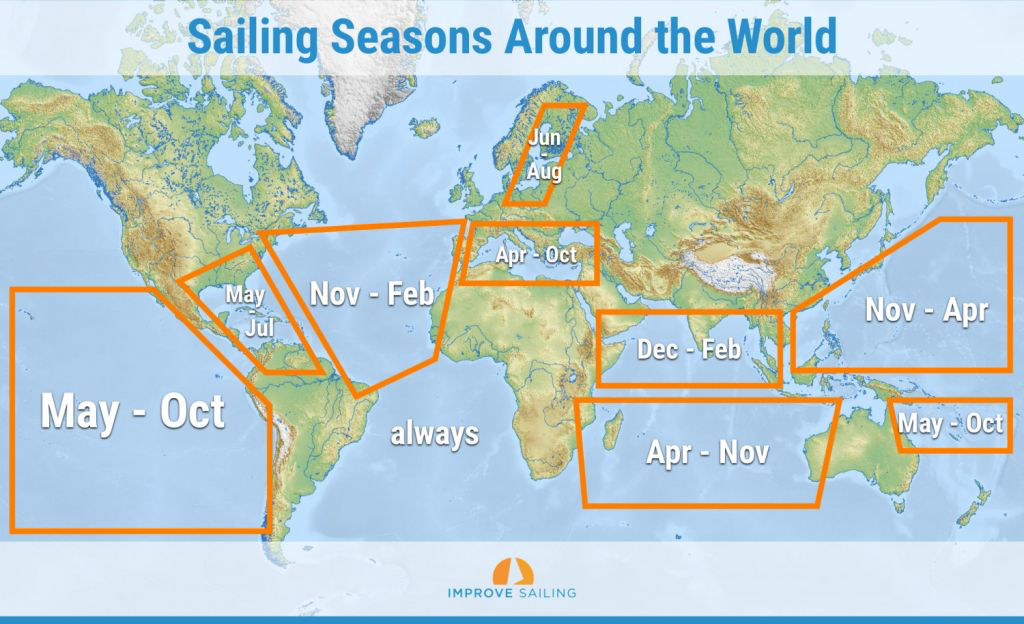
Credit: Improve Sailing
You can find a more detailed description of each sailing season on Improve Sailing’s website!
Caution! This sailing season map is not 100% accurate, so be sure to do your own research about your desired passage. To give you a head start, you can check out the Noonsite website .
Step 2: CHOOSE A BOAT HUB TOWN TO GO TO
Choose the city/ town where you would like to embark on your sailing trip from:
Certain coastal towns around the world act as a hub for sailors to pass through on their passages, but more importantly, many boat owners leave their boats in these towns during off-season. These coastal towns have marinas where boat owners can leave their boats in safe-keeping, and where owners can live while they complete boat maintenance & repair work, during these periods.
For instance, Rio Dulce (the town of Fronteras), in Guatemala, is a river off the Caribbean Sea, which is protected from the impact of the ocean’s unforgiving hurricane season. It’s also an affordable town in a developing country that features several marinas where owners can keep their boats for a more affordable price than in a country such as the US.
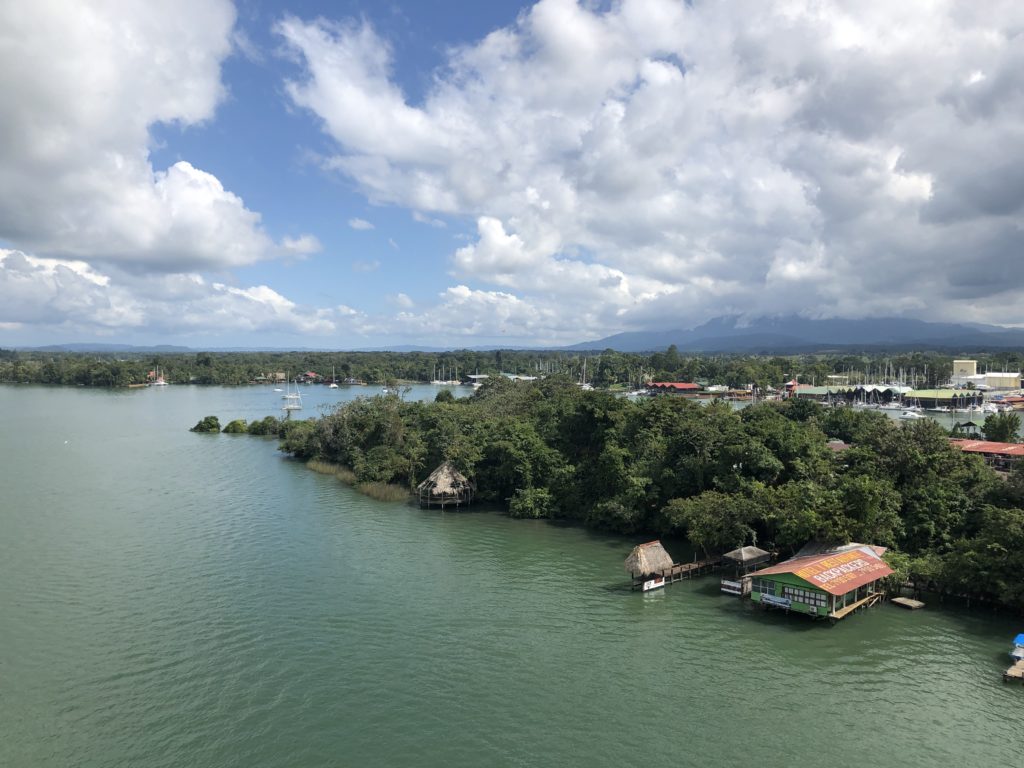
Views of the Rio Dulce, Guatemala, from the bridge!
Therefore, check to see if there’s any sailing towns nearby to where you are, or if you’re traveling, see if there’s any nearby to your upcoming destinations.
Caution: Be sure to plan sufficient time to find your boat! Leave at least 2-3 weeks for this process, because often boat owners may be waiting for a weather window, or need to finish up repairs on their boats, before heading off to sea. You want to be in a flexible position.
For instance, if it takes a week to meet your perfect match in the marina, and the boat owner(s) says they won’t be departing for another 2 weeks because they’re in the process of completing work on their boat, you don’t want to end up in disappointment that you don’t have the time to wait the 2 weeks.
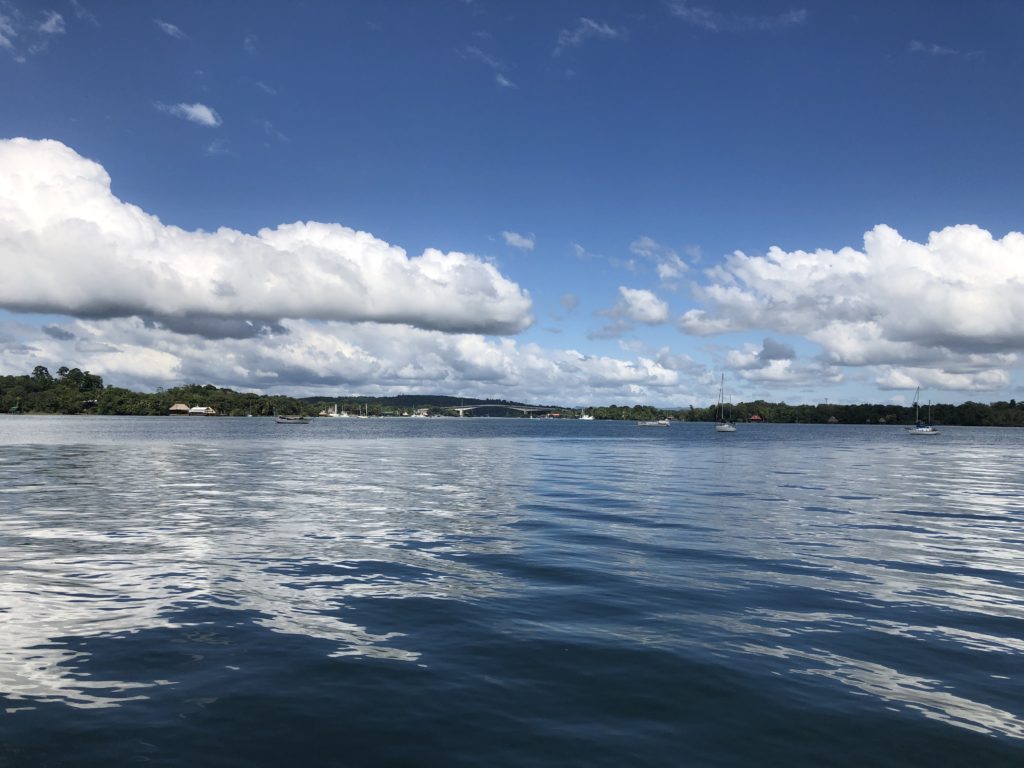
Rio Dulce, Guatemala, a protected area from hurricane season.
Where to be when…
Courtesy of the Alternative Sailing Community , here’s a few examples of “where to be and when”, if you’re chasing after a specific passage/ region for sailing:
- October to December for crossing the Atlantic.
- April to June to head into the Mediterranean.
- October to January for crossing the Atlantic.
- October and November to cruise the Caribbean
- Anytime for either boats to Mexico or boats to the South Pacific
- May to April to cross the pacific.
- September to December for boats to Mexico.
- January to March for boats to the South Pacific.
- March to July for boats to Australia or anywhere in the South Pacific.
- September or October for boats to the Caribbean.
- August for boats back to the USA.
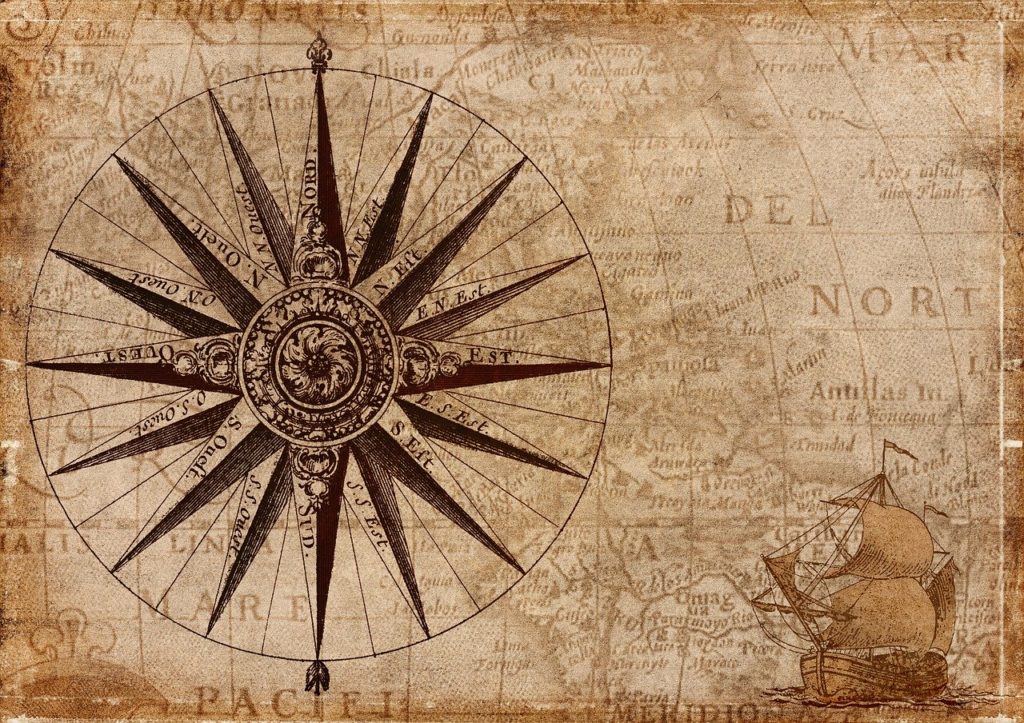
Step 3: CREATE A WRITE-UP TO SHOWCASE YOURSELF
A) facebook ad/ crew-seeking website profile.
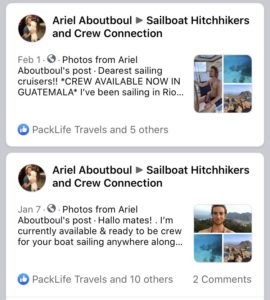
Snapshots of my Facebook ads posted on the Sailboat Hitchhikers and Crew Connection Facebook group. Create a write-up that provides key details about yourself and what you’re seeking! This will act as the “ad” that you’ll post on relevant Facebook groups, and which you can use in creating your profile on ‘crew-seeking websites’ (explained in Step 4).
I received positive feedback on my write-up, which I share with you below. Feel free to use my write-up as a template (or simply as inspiration) for your own! Take note of the specific details I included, such as my:
- Desired destination (mine was any destination!),
- Current location
- Dates of availability
- Sailing experience
- Spoken languages
- Relevant skills (cooking, trolly fishing, spear fishing, caring for children, etc.)
- Relevant qualities and traits (i.e., communication, easy going, detail-oriented, etc.)
- Hobbies and interests (this will give boat owners a hint whether you’ll be a good fit with them)
- That I don’t get seasick (good luck out at sea if you do! 😝), etc.
Additionally, be sure to include a few photos of yourself. It’s best if you can include relevant photos of yourself sailing, scuba diving, snorkelling, spear fishing, or any other adventurous photos!
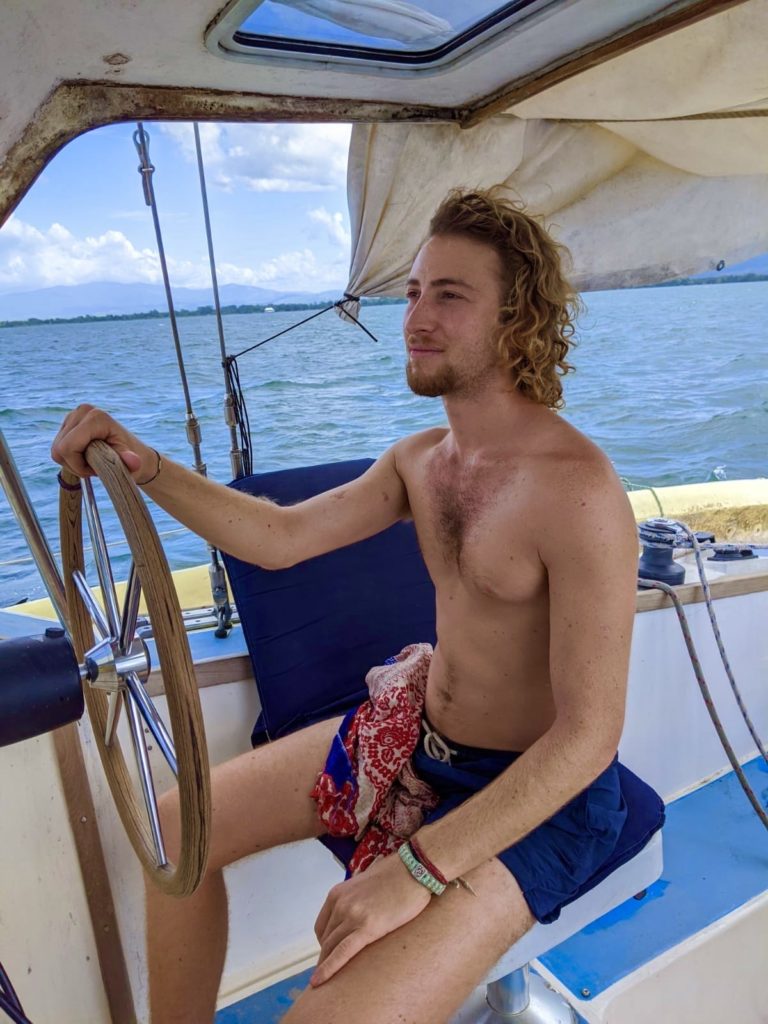
In my element, steering at the helm.
Here’s the ad I posted, as an example:
My Facebook ad/ Crew-seeking website profile
Hallo mates!
I’m looking to be crew of a boat sailing anywhere along the Central American coast or the Caribbean anytime from beg of January to end of February 2020. I’m currently in Guatemala but open to flying out to meeting you to join as crew, so I’m very flexible to make a sailing opportunity work! I’m not on a mission to “get anywhere” or to sail to “somewhere”. I simply love sailing and want to gain more sailing experience alongside good-hearted, safe people 🙂
Here’s bit about me:
16 months ago, I quit my corporate finance job, sold all of my belongings, and embarked on backpacking trip to travel the globe… a trip that soon transformed into a soul-seeking journey.
Since the age of 19, I’ve been backpacking the world a few months at a time, and I discovered traveling as a deep-rooted passion of mine. Over the last 10 yrs, my travel style has transformed drastically from the drunken rallying partier to the early-rising yogic adventurer.
Thus far, my journey has entailed local, cultural immersive experiences across developing countries, and moving between conscious communities in Asia and Central America.
My dream has been to be a crew member on a sailboat as part of my journey across the world. Since departing for my trip, unfortunately I have not yet stumbled upon a sailing opportunity. However, I am determined to make my sailing dream into a reality. I am eager to get back sailing again, expand my sailing knowledge, and learn how to sail across the oceans!
I’m respectful, easy-going, authentic, and an open communicator. I’m curious, always eager to learn new things (especially about sailing!), and absorb knowledge like a sponge.
My experience sailing is the attainment of my American Sailing Association level 1 certification, and sailing a 25ft Catalina for a few hours every Sunday after that! I’ve also been on a few overnight sailing trips for multiple days, so I know I don’t get seasick 🙂
Other than sailing, I love backpacking travel, scuba diving & snorkelling, surfing, swimming, hiking, camping, cooking, health, nature, live music, drawing, dancing my butt off, art, yoga and meditation.
Looking forward to hearing from you!
B) Ad for Marinas & for Sailor bars (Print-out)
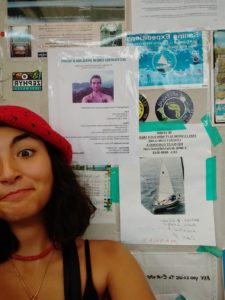
Friends taking selfies with my ad posted at Sun Dog Cafe & Bar in Rio Dulce, a Guatemala.
Create an ad to print out and post up in marinas and at the local sailor bars.
Include basic information about yourself in your ad, such as your:
- Citizenship
- What you’re looking for (i.e., to be crew on a cruising boat)
- Desired destination
- Dates of availability
- Relevant skills and experience (i.e., can swim, can cook, can fish, don’t get seasick)
- Relevant qualities/ character traits (i.e., easy to get along with, strong communicator)
- Interests/ Hobbies
- Contact information is key! Ideally you’d have a local SIM card, so provide your whatsapp # and your local phone #. You can also include your Facebook web address.
Additionally, don’t forget to include at least 1 photo of yourself.
Here’s the ad I printed out, as an example:
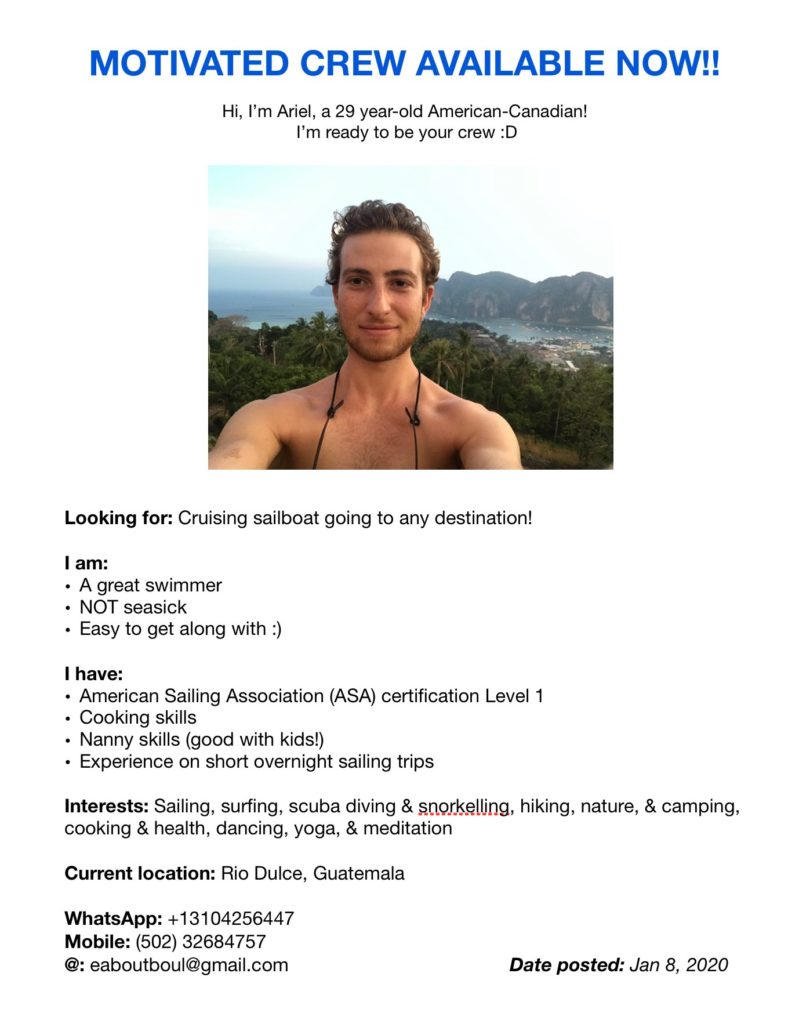
I recommend making your print-out ad stand out a little more than mine. For instance, you can add a border around the page with colors, and print it out in color if you can!
If you’re not situated in a town with boat marinas, then this print-out ad wouldn’t apply to you. However, I highly recommend you to situate yourself in a coastal town!
Step 4: POST ADS
A) worldwide crew finder facebook groups.
The purpose of these Facebook groups connect sailors and crew from across the globe.
There are 4 main Facebook groups you can join where you can post your crew-seeking Facebook ad (discussed in Step 3):
- Sailing Crewfinders Whole World, Long Sailing Trip, Regatta
- Sailboat Hitchhikers and Crew Connection
- Sailboat Crewfinder Worldwide
- Sailors Find a Crew or Be a Crew
Every few weeks, I recommend reposting your Facebook ad in these groups, in order to refresh visibility of your ad.
B) Crew-seeking network websites
These are social network websites specifically designed for sailors to find crew.
Many of these websites require a membership fee, however, I will share the 2 free and most effective crew-seeking websites I used:
- Find a Crew
C) *TOP TIP!* Local Cruisers Facebook Groups (and Forums)
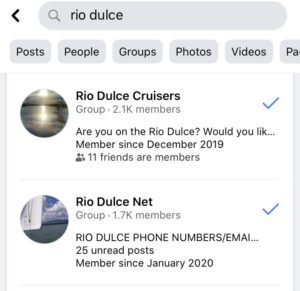
Although these local groups have a rather insignificant number of members, the activity in these groups is extremely high (often 25+ posts a day!).
If you are in a boat hub town, or if you know which coastal town you plan to depart from, this is an extremely effective step for finding crewing options.
Find the relevant local Facebook groups or forums for the cruisers in that town. These Facebook groups and forums exist for all the cruisers/ boaters in that community to communicate about local news, events, and other boat-related discussion. These Facebook groups are not specifically for finding crewing opportunities, but it is extremely relevant for you to post your ad about you’re seeking after!
Repost your ad in these groups every few weeks, in order to refresh visibility of your ad.
I found the local cruisers Facebook groups in Rio Dulce, Guatemala, by searching Facebook and Google for “Rio Dulce Cruisers,” “Rio Dulce Cruisers Net,” and “Rio Dulce Cruisers Forum.” I also asked the local sailors in Rio Dulce if there were any Facebook groups for the local cruisers.
Here’s some examples of the local cruisers Facebook groups & the forum which I used in Rio Dulce:
- Rio Dulce Cruisers
- Rio Dulce Net
- Rio Dulce Chisme – You can post in the classifieds section.
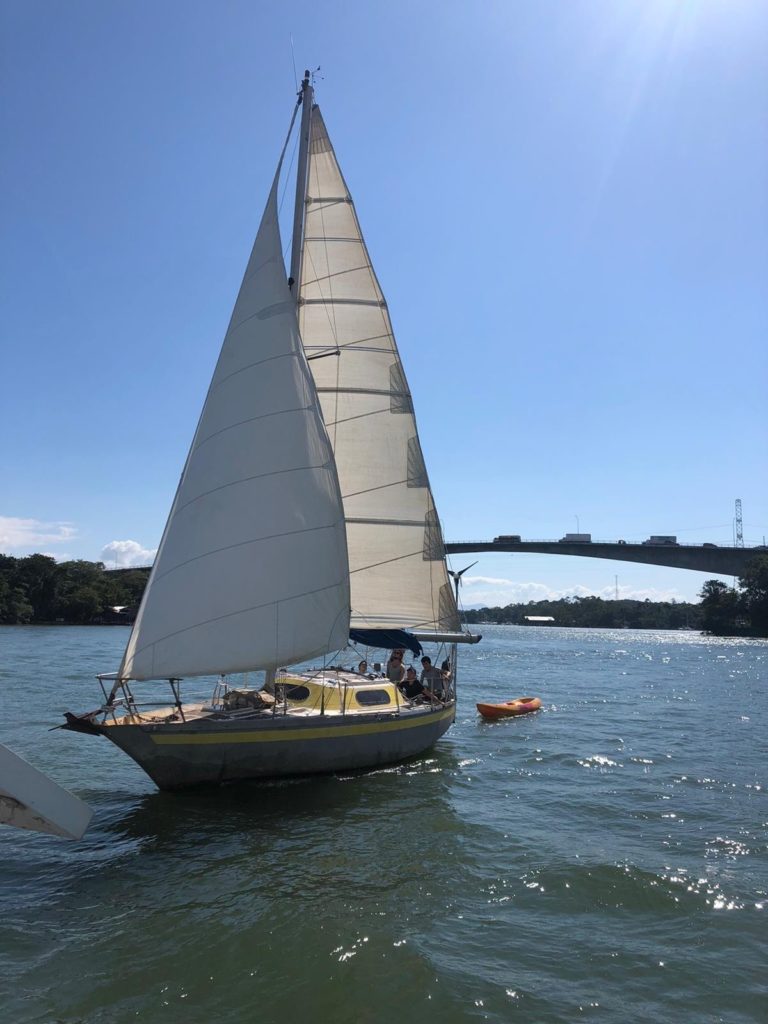
The Rio Dulce bridge
Facebook groups
Check the Facebook groups regularly for responses to your posts, but even more importantly, check regularly for new postings by boat owners and sailors with crew positions available for their boats! Respond to these postings as promptly as possible, and send them a private message through Facebook as well. In your private message, briefly introduce the crewing opportunity you’re looking for & your availability. Beneath your intro, simply copy-&-paste the detailed write-up you created about yourself in Step 3 (boat owners will typically request you to tell them about yourself and your experience anyways, so this will cut down back-and-forth communication time!).
You can also check in the comments section of posts created by other crew-seekers to see if any sailors wrote them back about potential crewing opportunities. If you find any relevant leads for yourself, private message those sailors.
Crew-seeking websites
Similarly, invest time to regularly search the crew-seeking websites for opportunities in your desired departure location (you can search for boats by location), and connect with the boat owners. Do not wait for boat owners to reach out to you, because it doesn’t happen very often!
Step 6: *TOP TIP!* BE ACTIVE IN THE BOAT HUB TOWN YOU’RE IN!
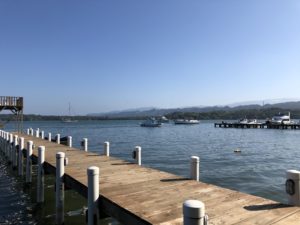
Do the “dock-walk”!
If you’re in a boat hub town where there’s a community of boaters and sailors, spend a few hours strolling through each of the marinas during the afternoon. Walk up to people sitting at the marina’s restaurant/ patio, people on the boats sitting in the water, and even people working on their boats on ‘the hard’ (i.e., in the marina, but sitting out of the water). Similarly, in the evenings (from 6pm – 9pm) visit the local sailor bars, and approach whoever is around. Start conversations with these persons with the goal of learning if they know of any boats looking for crew.
This may seem like a daunting task, but the sailing and boating communities are filled with kind-hearted people who are interested in booth socializing and helping others in the community.
I was well-received by most (not all!) of those whom I sparked conversation with! It’s all part of the crew-seeking adventure 🙂
Funny enough, many of the people I approached at the marinas & bars recognized me from the Facebook ads I posted in the local cruisers Facebook group! Haha.
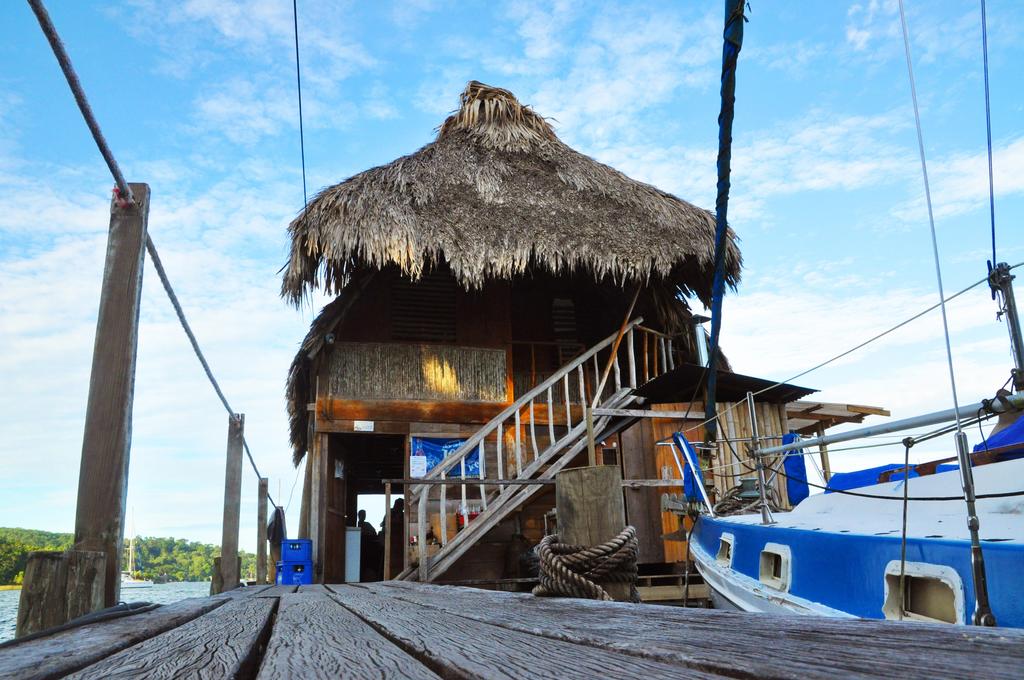
‘The Shack’, a sailor bar in Rio Dulce, Guatemala. I taped my ad on the wall right above the only men’s toilet!
Here’s an example of my ‘conversation starter’ when I approached people at the marinas and bars:
“Good morning! I’m visiting the marinas to see if there’s anyone you may know who is leaving on their sailboats in the next 1-2 weeks, and is looking for crew. Would you happen to know of anyone?”
In asking this, I’m also asking the persons I’m speaking with if they’re seeking crew!
As you’re going through all of the marinas and bars, take advantage of this time to post your printed-out ad there —- Just a head’s up, the best spot is the men & women’s bathrooms.

By far, the BEST strategy to get the most opportunities is to get access to a VHF radio from one of the boats in the area, hop onto the local channel, and announce your personal ad & contact info to the net. This will instantly publicize yourself to all the boat owners in the area.
For instance, in Rio Dulce, every morning they have the “Cruisers Net” from approx 7:30am – 8:30am on radio channel 69. I made a few sailor friends in the area, and they happily allowed me to swing by in the mornings & use their VHF to make my announcement. Also, while I was walking through the marinas in Rio Dulce, I was directed to the office of the woman who hosts the ‘Cruisers Net’ (on channel 69) every morning, and she was willing to make the ad announcement on my behalf each morning.
Step 7: CHOOSING AMONG YOUR OPTIONS
Remember your motivation.
Don’t settle for the first crewing opportunity that appears at your feet in fear of not coming across any other opportunities, particularly, if you’re situated in a sailing town. Trust me, I’ve made that mistake, and I ended up miserable!
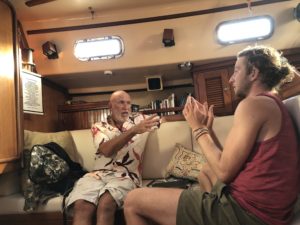
The captain answering all of my questions about boat engines and batteries. A dream come true ✨
As discussed in the previous post , know what your motivations are for crewing, and choose your boat based on how the opportunity satisfies those intentions. It’s always a good idea to be upfront with boat owners and communicate your intentions to them.
- For instance, if your motivation is to find transportation to a destination, in exchange for helping out on the boat during the passage, then grab onto any opportunity you find (of course, given that you feel safe with the captain & crew).
- On the other hand, if you legitimately want to learn about sailing, then be sure to assess the boat owners’ adeptness in explaining concepts. You can do this simply by asking questions the captain questions (i.e., about their boat, their sailing experience, etc.), and taking note of the following: Do they seem willing to provide explanations? Are they willing to elaborate further? How do they respond to follow-up questions (i.e., do they have patience)? Do you resonate with their style of teaching? Is there a language barrier?
- As you may have experienced in other life situations, not everyone is adept at explaining or teaching. If you don’t feel you will learn from a certain captain, then don’t choose that boat!
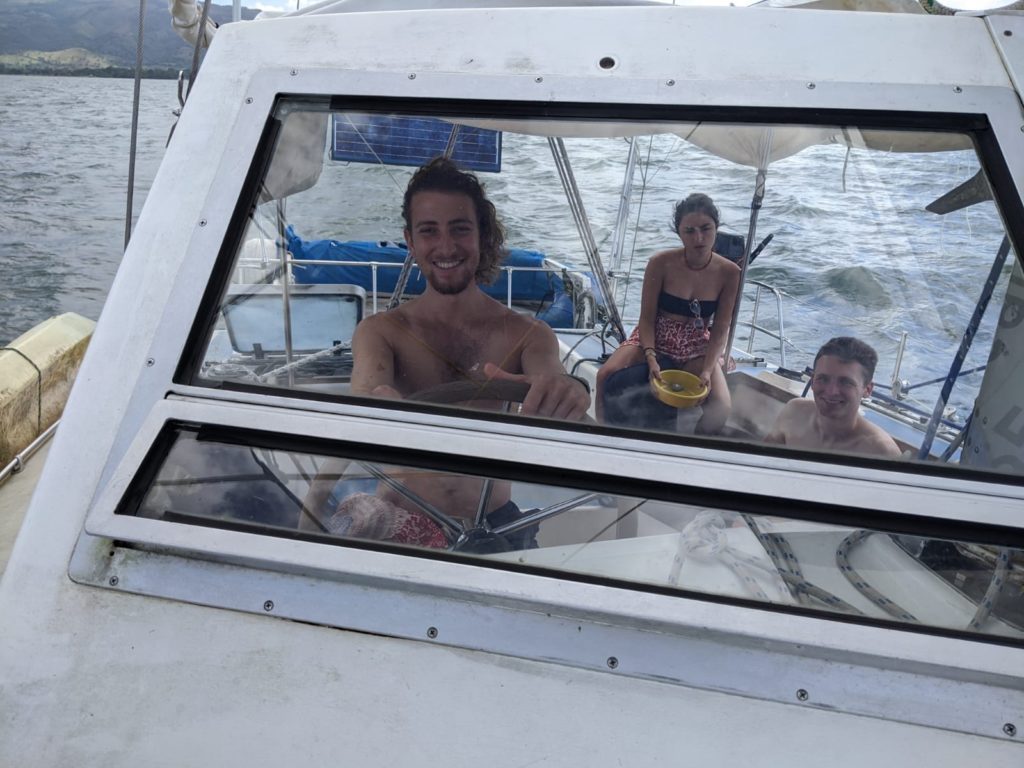
The captain encouraged me to practice hand-steering the boat at the helm!
Assess the vibes of the captain & crew
Meet with the captain & crew in person before committing, preferably more than once.
- One time meet the captain & crew in a bar or restaurant, and observe if they are healthy drinkers and eaters. In other words, make sure the captain isn’t a drunk! Get a sense about the captain’s (and crew’s) experience sailing at sea (i.e., have they completed numerous passages?, how many years have they been sailing for?), and pay close attention to their manner in responding to your questions (i.e., do they sound confident and trustworthy?).
- At a separate meetup, arrange to visit them on the boat, and observe whether the boat is well-equipped (i.e., worn-out lines are not a good sign), and whether there are a reasonable number of people onboard (i.e., the boat is neither over- crowded, nor under- crewed ).
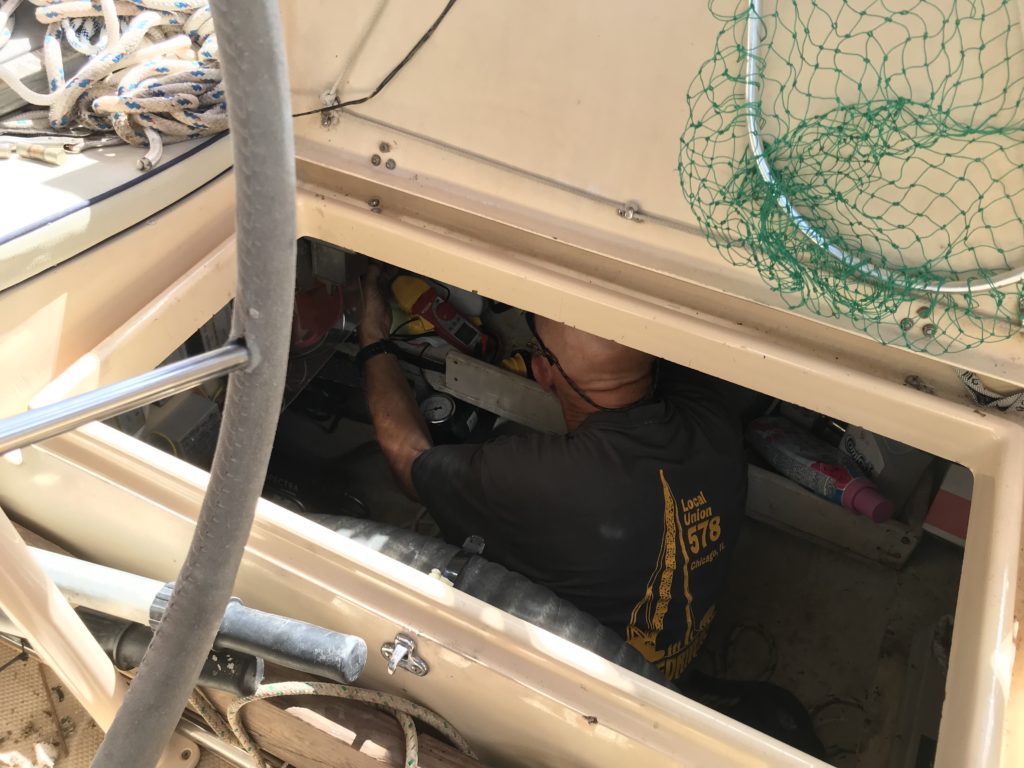
Choose a boat that’s captained by an experienced sailor, who is knowledgeable in repairing any broken boat parts, or any electrical/ engine failures. Any combination of these failures can happen at sea, which I personally experienced!
- If time permits, request to spend a night or two on the boat with the captain and crew before departing to sea. This allows you to see what it’s like to live with them in the closed quarters of the boat. They need to get to know you as well, so it’s within both of your interests!
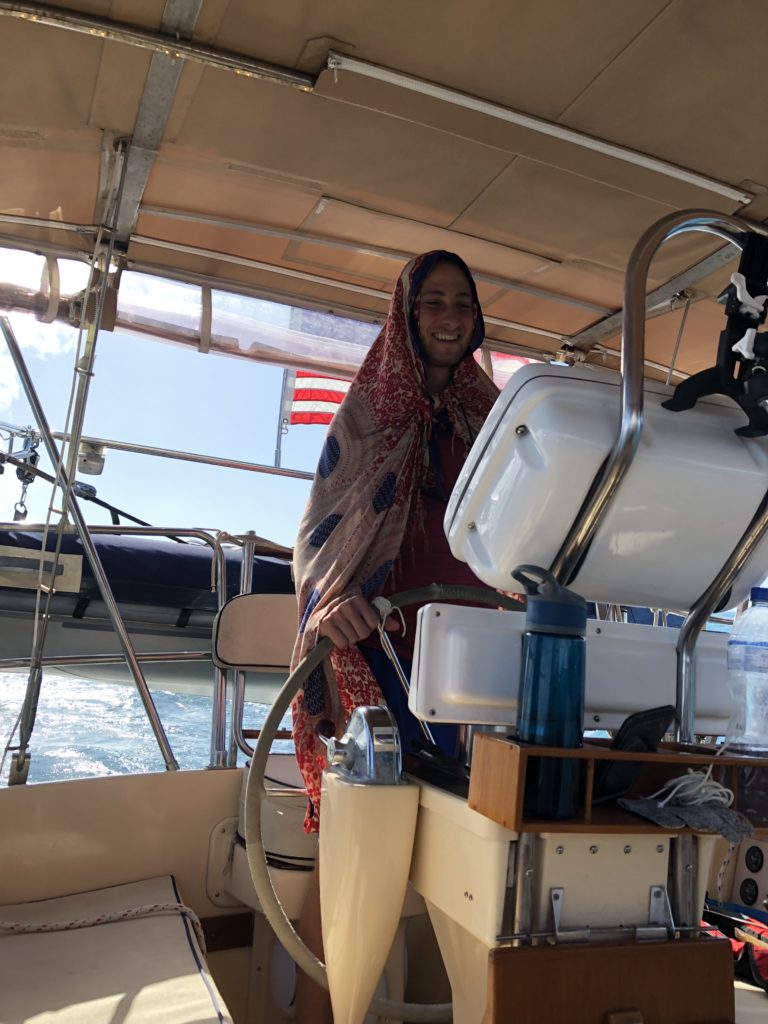
Choose a boat where you feel comfortable to be yourself. Here’s me wearing my old woman head covering as my sun shield.
Always be prepared with back-ups of other crewing opportunities in case your boat cancels on you. This happened to me several times for a wide variety of reasons (i.e., a buyer put an offer to purchase the boat owner’s boat, the boat-owning couple had a fall-out in their relationship, repairs are taking longer than expected, etc.).
A great option for sailing in Guatemala!
If you’re near Guatemala, a great way to ‘get your foot into the companionway’ is to spend time sailing with Daeli’s Sailing Community in Rio Dulce. It gives you the opportunity to learn the foundations of sailing in calm, serene lake waters, as opposed to out on the tumultuous waves of the seas.
I laid out all the ‘ins-and-outs’ of the sailing community in a previous post if you’re interested in learning more about it!
The pool of crew competing for boat positions, in comparison to the number of boat owners seeking crew, may seem daunting. However, when you find yourself in a sailing town, you’ll understand that this is not in fact the case!
So, simply set your intentions on finding a crew position, invest your energy into your intention, and your dream will become your reality.
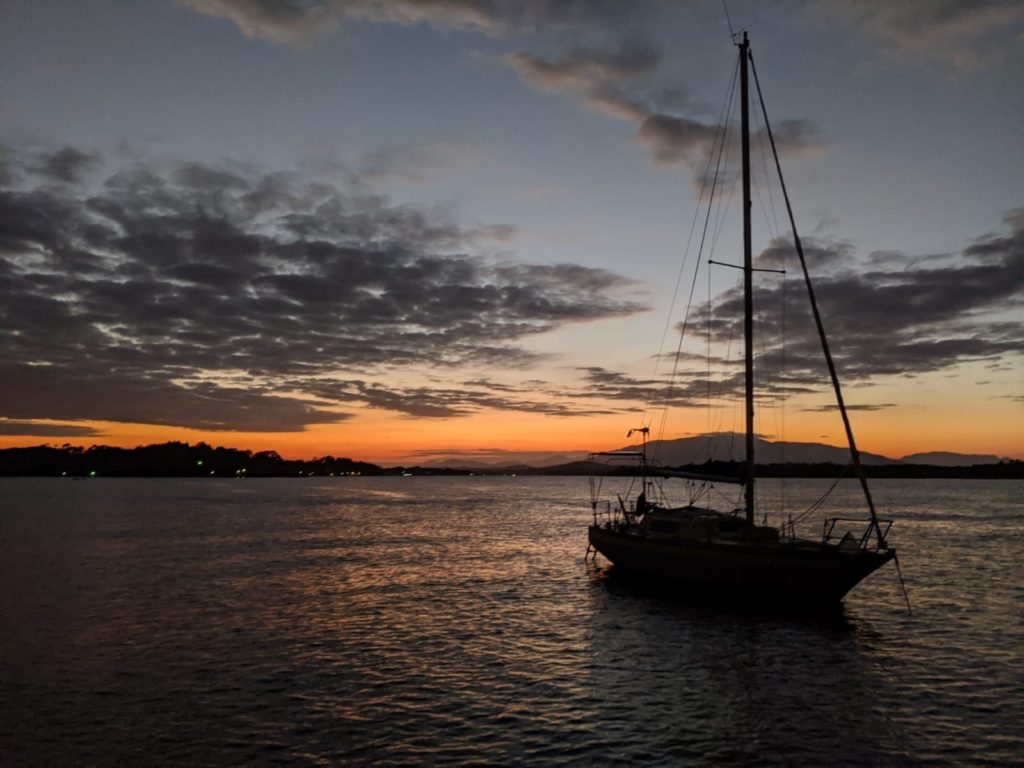
1 Comment on How to Find a Sailboat to Crew for, or Hitchhike on!
Hello ! Thanks for your post, it’s really interesting. I’m in Rio Dulce at the moment and I was wondering if you could share the contact of the woman who was willing to make the ad announcement on your behalf each morning on the radio. That’d be a huge help to get a boat ! Thanks in advance 🙂
Leave a Reply Cancel reply
Your email address will not be published. Required fields are marked *
Save my name, email, and website in this browser for the next time I comment.
« Crewing or Hitchhiking on a Boat Around the World!

©2021-2024 Unveil with Ariel Privacy • Terms
design by weave the light
- International edition
- Australia edition
- Europe edition

Greta Thunberg sparks surge in sailboat hitchhiking
Since climate campaigner’s transatlantic adventures, more people are looking to travel by sail
H itching a ride on a sailing boat across the Atlantic might sound like a far-fetched endeavour reserved for the famous and well-connected. But Greta Thunberg has now managed it twice in three months – and her antics appear to be inspiring a growing, if nascent, movement in sail-hitching.
Maritime hitchhiking has hitherto been reserved for sailors looking for experience on different routes and vessels.
But after Thunberg’s transatlantic adventures, numbers have boomed. Daniel Krause, a full-time “cruiser”, helps to run the Sailboat Hitchhikers and Crew Connection Facebook group, which has sharply increased to nearly 21,000 members since Thunberg’s voyage. “In the past couple of weeks it has skyrocketed,” he said.
What is the Upside?
Ever wondered why you feel so gloomy about the world - even at a time when humanity has never been this healthy and prosperous? Could it be because news is almost always grim, focusing on confrontation, disaster, antagonism and blame?
This series is an antidote, an attempt to show that there is plenty of hope, as our journalists scour the planet looking for pioneers, trailblazers, best practice, unsung heroes, ideas that work, ideas that might and innovations whose time might have come.
Readers can recommend other projects, people and progress that we should report on by contacting us at [email protected]
People use the site to find crew members for their boat, or to find a vessel to hitchhike on. “It’s mutually beneficial,” says Krause. “You get a mostly free ride and the owner gets someone who can do nightshifts or who can help out with docking, anchoring and boat manoeuvres.” In most instances, hitchhikers just pay for transport to and from the boat, any visas they might need, and contribute to boat running costs like food.
However, Krause has found many of the group newbies don’t have previous sailing experience. “Many people don’t understand about the movement of a boat on the ocean which can overwhelm people with seasickness and make them feel trapped because it’s a very small space and you could be out there for days if not weeks - and once you’re out, it’s almost always too late to turn back,” he says.
“Sailboats can only go with weather and wind. Hitchhikers need to be aware that there are forces way bigger than the will of the people on the boat; it might be that the weather decides for you where you go.”
There are dozens of Facebook groups and sites offering similar services. SailingNetworks was set up in 2004, originally branded as Crew Reunited to help boat crews stay in touch after a voyage. Now budding crew members set up profiles on the site to find captains willing to take them on.
According to company director Jeremy Pocock, “younger people are seeing the opportunities to explore by getting on a boat as much more realistic than they might have done in the past”. He advises that anyone considering boat hitchhiking goes for a test run first, and then goes for a drink with the captain and crew afterwards, to ensure compatibility with both the vessel itself and the other personalities on board.
Lawrence Herbert, a 22-year-old psychology graduate, is currently hitching rides on boats around the world to build up his already quite extensive sailing experience. He’s had some scary incidents over the years, which he says beginners might not be prepared for. “I’ve had a big sail stuck at the top of the mast with too much wind which was pretty terrifying. Someone had to go up to the top of the mast in pretty bad weather and cut the sail down, which is about as bad as it gets.”

He’s currently en route to Southampton, where he’s got a place on a boat heading across the Atlantic to Saint Martin in the Caribbean, and has noticed a huge increase in aspiring boat travellers this year. “I do think the Greta Thunberg effect is huge. There’s an enormous amount of people in Gran Canaria [a popular hub for people seeking passage across the Atlantic], many who don’t have sailing experience, just trying to get on a boat.” He says these people often exchange cooking skills for passage.
The demand could indicate commercial potential for an eco-friendly transatlantic sailing service, says Ross Porter, founding director of ethical travel company VoyageVert .
“There’s no ticketed, fossil-fuel-free way of getting across the Atlantic. Now there’s all of this exciting technology that can be harnessed and applied to a problem that we have in the world, which is moving people sustainably over long distances.”
He is seeking funding to build a sustainable sailing ferry capable of transporting 200 passengers 480 nautical miles in 24 hours - meaning it could transport people from Southampton to New York in around eight days. Porter eventually envisions this as a fleet which could sail a vast network of routes across the globe – and become the future of travel.
A similar revolution is already underway in the shipping industry , which accounts for 2.5% of global carbon emissions, with companies developing strategies to transport goods on emission-free sailing vessels.
For Krause, the increased interest in sailboat travel is a logical consequence of eco-friendly lifestyle trends that have grown in popularity in recent years. “People want to downgrade their consumerism and also travel sustainably, and that’s the perfect combination on a sailboat.”
This article is part of a series on possible solutions to some of the world’s most stubborn problems. What else should we cover? Email us at [email protected]
- Travel and transport
- Water transport
- Greta Thunberg
Most viewed
Yacht Crew Wanted
Amateur and professional yacht crewing positions available worldwide, from daysailing to transocean for all experience levels.
Search sailing opportunities
For yacht crew
It’s free for everyone to browse though all of our current sailing opportunities. Become a member to contact yacht owners and join their crew.
For yacht owners
Registration and posting is free if you are looking for a skipper or crew. Find amateur and professional crew for short or long term voyages.
Featured sailing opportunities
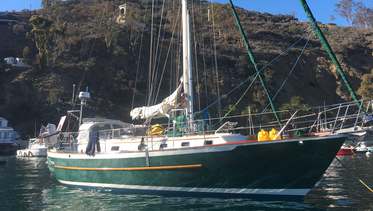
PS40 MX to Papua New Guinea by early '24
Boat type: Cutter Rig Bluewater Passage Maker
Location: Puerto Vallarta, Mexico
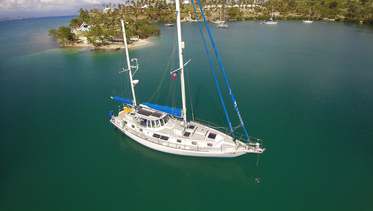
Crew wanted for Mediterranean and beyond
Boat type: Gulfstar 50 MK ll Ketch totally rebuilt 2015
Location: Italy, Spain, Morocco, France, UK
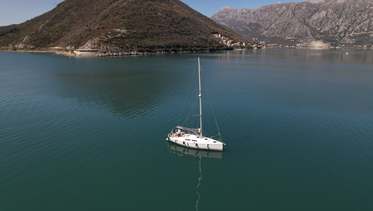
Americas Cup (AC37) Barcelona 2024
Boat type: Hanse 385
Location: Tivat Montenegro
Coastal yacht cruising
Professional sailing jobs, ocean sailing voyages, yacht delivery crew, worldwide opportunities, varied vessel types, all experience levels, mile building voyages, short notice sailing, environmental & wildlife vessels, we are recommended by.

Crewseekers notices
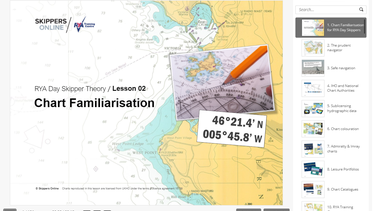
Day Skipper & Yachtmaster theory courses - 20% off
Online RYA theory courses with a great discount courtesy of Crewseekers.
Skipper for Private Catamaran Charters in Malta
More information

Training for a career at sea?
What qualifications do you need to get the jobs you want?
we love sailing as much as you do
Crewseekers is run by experienced, professional sailors offering a friendly and helpful service to yacht crew and owners. We are the original yacht crew introduction agency – established for over 25 years, offering amateur and professional sailing opportunities throughout the world.
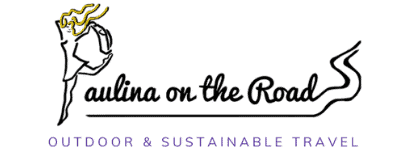
Boat HitchHiking ABC
How to cross oceans without owning a boat.
Did you decide to start your own boat hitchhiking adventure? Congratulations! It will be the best decision you have ever made!
As it will not be an easy ride, I recommend reading first how to get started in boat hitchhiking.
Personally, I admit that crossing the Atlantic ocean from Tenerife via Cape Verde to Barbados has been a life-changing experience in many senses.
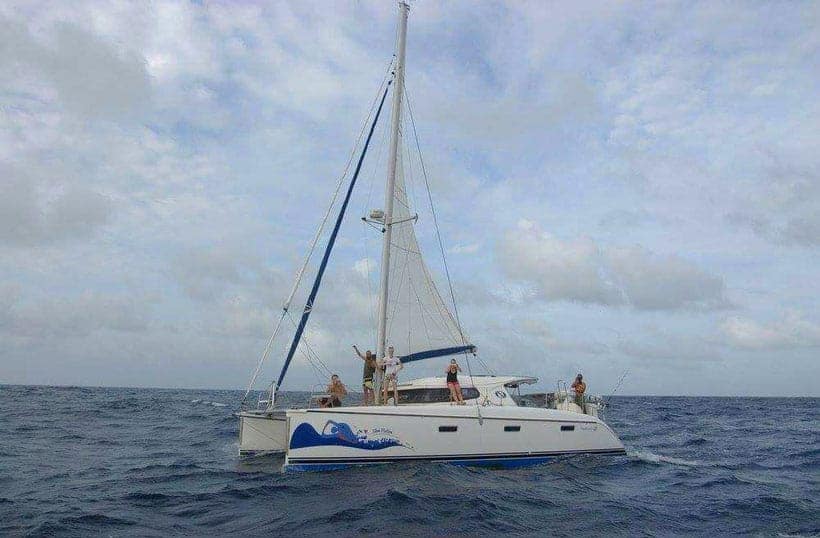
Bayview Hitchhiker Thursdays Are you interested in a new adventure? Would you like to meet new people while enjoying fresh air and sunshine on one of Detroit's gems - the Detroit River? You’re Invited to “Hitchhiker Thursdays” at Bayview Yacht Club. Attendance is limited each week and pre-registration is required .
- Hitchhiker Thursdays is a program to welcome new people interested in sailing and get existing sailors out on the water.
- Thursday races, which happen right in front of BYC, are a perfect opportunity to test the waters of our sport or try racing on a different kind of boat.
- The evening will start with a gathering at Jerome’s on the Dock between 6 and 6:30PM. This area is attached to the bath house down past most of the docks on the left when coming in.
- Non-member guest parking is just inside the first gate before the "Members Only Parking" sign. Allow extra time to walk down to the bathhouse where the boats are docked.
- Each week 2 volunteers are needed to assist with Race Committee to record starts and finishes of the race and monitor the race. Without race committee help the Thursday night races could not happen! No experience required. This is a great way to get involved off the water!
- Hitchhiking participation is limited for each race/night. Hitchhikers must be over 15 and RSVP through SignUpGenius to participate. Preference is given to first-time hitchhikers. More spots may be added throughout the summer as we gain more boats participating.
- Skippers, boat owners, and/or crew of boats racing will come down and introduce themselves or you will be escorted to a participating sailboat by a Hitchhiker/Membership Volunteer (Bright Green Shirts).
- Timing depends on Mother Nature but plan to be on the water for about an hour. The racing starts around 7PM. Boats leave their wells around 6:45.
- Sailboat racing occurs in all weather conditions. If a race is cancelled due to weather it is usually just before the start of the race. We typically do not send notice of cancellation. It is at the discretion of the participant if they would like to cancel due to the weather forecast.
- Spread the word!! Thursday’s races are a GREAT time and an awesome introduction to what Bayview Yacht Club has to offer! SAIL OR HELP WITH RACE COMMITTEE!
- Thursday race dates are can be found here . NOTE: There will be no Hitchhiker Thursday on May 25th and July 27th.
- Email [email protected] if you would like more information.
Things you buy through our links may earn Vox Media a commission
Thousands Rush to Join Sailing Clubs to Be More Like Greta Thunberg

Currently, Swedish teen climate activist Greta Thunberg is on her second transatlantic sailing trip of the year. Back in August, the 16-year-old sailed for two weeks from Plymouth, U.K., to New York City to attend U.N. climate talks, and now, three months later, she’s returning home . For reasons that remain unclear, her trip enraged some adults, who mocked the teenager’s travel choices on social media , and boasted about their own emission-heavy air travel. (Whatever floats your boat, er — fuels your plane.) But according to The Guardian , Thunberg’s boat travel also inspired thousands of people to follow her lead — or to attempt to, at least, by joining sailboat-hitchhiking groups online.
Sailboat hitchhiking — securing free voyage on a sailboat in exchange for helping out on the boat — has traditionally been undertaken by experienced sailors looking to travel different routes, or try out different vessels. But now, more people are turning to it as an ecofriendly way to travel.
Daniel Krause, a “cruiser” who helps to run the Sailboat Hitchhikers and Crew Connection Facebook group, told The Guardian that since Thunberg’s trip, the group’s size had gone from 7,000 to nearly 21,000 members. “In the past couple of weeks it has skyrocketed,” he said.
The arrangement can be mutually beneficial, Krause says, as some travelers with sailing experience can help crews with docking, anchoring, and boat maneuvers. Long-distance sailing is not for the faint of heart, though, and not all sail-hitchers are as knowledgeable as Thunberg.
“Many people don’t understand about the movement of a boat on the ocean which can overwhelm people with seasickness and make them feel trapped because it’s a very small space and you could be out there for days if not weeks — and once you’re out, it’s almost always too late to turn back,” Krause says.
Currently, there’s “no ticketed, fossil fuel–free way of getting across the Atlantic,” Ross Porter, founding director of ethical travel company VoyageVert told The Guardian , so those who want to travel while minimizing their carbon footprint have to band together in online communities.
As for Thunberg, she is now on the second day of her return trip. Only time will tell whether another eco-prince will appear on this voyage.
- greta thunberg
The Cut Shop
Most viewed stories.
- Rose Hanbury Says She Didn’t Have an Affair With Prince William
- ‘How Should I Handle My Co-worker’s Unhinged Rants?’
- Lukas Gage Calls Marriage to Chris Appleton ‘Unhinged’
- Looks Like the Palace Is Hiring a Communications Assistant
- Who Is Rose Hanbury and Why Can’t Kate Middleton Escape Her?
- How I Got Scammed Out of $50,000
Editor’s Picks

Most Popular
What is your email.
This email will be used to sign into all New York sites. By submitting your email, you agree to our Terms and Privacy Policy and to receive email correspondence from us.
Sign In To Continue Reading
Create your free account.
Password must be at least 8 characters and contain:
- Lower case letters (a-z)
- Upper case letters (A-Z)
- Numbers (0-9)
- Special Characters (!@#$%^&*)
As part of your account, you’ll receive occasional updates and offers from New York , which you can opt out of anytime.
Uphill challenge as beach users with disabilities call on governments for equal access to Australia's coast
Sun, sand, the lure of water, and waves that carry you weightless to the shore.
The beach is an idyllic escape for some, but Shane Hryhorec says it can make others feel "locked out of life".
"The beach can make someone with a disability feel very disabled," he said.
The former surf lifesaver said his love of the ocean drives his passion to make Australian beaches available to everyone.
"I think people with disabilities typically have a love-hate relationship with the beach," he said.
Australia has around 12,000 beaches but only 150 have some form of access for people with disabilities.
A petition organised by Accessible Beaches, a charity founded by Mr Hryhorec, is calling on the federal government to increase funding and support to councils and surf life saving clubs to make beaches more accessible.
Mr Hryhorec said he started Accessible Beaches to address a wave of need along Australia's coastline.
He offers his lived experience and consulting advice to governments and other organisations.
According to Australian Bureau of Statistics figures from 2019, 4.4 million Australians identify as living with a disability.
This includes mobility, sensory and visual challenges.
In addition to people with a disability, getting to the beach is also a challenge for the country's rapidly growing aging population.
"When you get older, you just assume when your hip starts playing up and your foot, you just stop going to the beach … that doesn't have to be the case when a beach is made accessible," Mr Hryhorec said.
A ramp to nowhere
Mr Hryhorec believes councils and governments are missing the mark when it comes to making a beach accessible.
"Some councils are very proactive, others have a very tokenistic approach," he said.
"Like with Bondi Beach, they've got beach matting and beach wheelchairs, but it's not easily accessible and if you ever go to Bondi beach, you'll see their matting is never out."
In a statement, a spokesperson for Waverley Council says the beach matting at Bondi Beach is rolled out "depending on the weather and tide conditions".
The spokesperson says the beach offers a ramp for wheelchairs, accessible showers, toilets, disability parking areas, two beach wheelchairs and wheelchair lockers.
A beach mat stops a wheelchair from sinking into soft sand, providing access all the way onto the beach itself.
They also provide safe passage to the water's edge for those with sensory, visual or other mobility issues.
Disability advocates want beach matting to become a standard feature where possible in all coastal Australian towns.
Elite athlete David Munk would like to see more accessibility for wheelchair users in his home town of Byron Bay.
The world champion skier and adaptive surf title holder relies on friends and passers-by to help him get back up the steep boat ramp that he uses to access his local surf break.
"The only reason we surf [at the Pass] is because [there's] a boat ramp, it's not like the council did anything to make it accessible," Munk said.
Life's possibilities
For those with access issues, being able to use the beach is a joy.
Katie Aspinall grew up in the water, swimming at state level and surfing, but that came to a halt when she suffered a massive seizure in 2022
She now uses a wheelchair after being diagnosed with Functional Neurological Disorder.
A recent all abilities beach day at Mooloolaba got her back in the ocean, which she said gave her a sense of life's possibilities.
"It was like an open door, I can actually do things, even if I can't use my legs, I can still enjoy life in a wheelchair," she said.
Adapting for the Adaptive world titles
Byron Bay is preparing to host the Adaptive Surfing Professionals World Championship on March 17.
Organiser, five-time world champion and amputee Mark Stewart said access was not perfect in Byron Bay, especially for wheelchairs, but he hoped that was changing.
"It's been good working with the council and they've been coordinating ramps getting rebuilt and changing the gradients to make it more wheelchair friendly," he said.
After losing his leg at 16, the water became Mr Stewart's solace.
"On land, you can see our physical disabilities, but we get in the ocean, you can't see it," he said
"You can relax out there, because no one knows that you have a disability."
Stewart said he was "stoked" Byron Bay was hosting the event, not least because the town could learn valuable lessons from the less able-bodied community.
"[The event will host] 85 athletes from 16 nations — their outlook on life is just so amazing," he said.
"[They] live life to the fullest, they bring that enthusiasm, they're hugely open people and more than willing to talk about their experiences."
ABC North Coast — local news in your inbox
- X (formerly Twitter)
Related Stories
Why rocky and goldie just played in the surf for the first time, despite living close to the beach.
Adaptive surfing champion Mark 'Mono' Stewart scores two perfect rides at Japan Open
Teen wins surfing world title one year after 'scary' diagnosis limits the use of his legs
Thanks to this accessible beach, Mila can feel 'power from the water' again
Why surf therapy has been 'beyond amazing' for 7yo Pearl
- Disabilities
- Discrimination
- Federal Government
- Henley Beach
- Local Government
- Regional Communities
- Social Policy
- Travel and Tourism (Lifestyle and Leisure)

IMAGES
VIDEO
COMMENTS
Meet people who want to travel by sail boat or yachts, meet sailboat owners who need crew to cross the ocean or a short passage, find a boat or a captain for hire -... Sailboat Hitchhikers and Crew Connection
meet people who want to travel by sailboat ask questions And meet sailboat owners.
As sailboat hitchhiking involves traveling long distances in a small space with other crew members, good social skills are highly valued. "Skippers and boat owners prioritize good people over good sailors," the guys said," The important attributes are a positive attitude and an open mind. Each skipper has different rules and so it's ...
Sailboat Hitchhiker's & Crew Connection's ⛵️. Do You Want To Travel The Oceans & See The World? See Distant Islands, & Exotic Beach's? Meet kind, respectful people who want to travel by sail boat or...
Martin Booth and Helen Doody have also sailed round the world on different yachts taking part in a rally. He says: "Safety is important: 100%. Travelling in a rally means a huge amount as people ...
Though there are common routes, sailboat ride hitchhiking isn't simply going from A to B, like hitchhiking with a car or taking a ferry. Sailboats deal with seasons, routes, weather, breakage, and all sorts of variables. You can't 'just' find a boat going from Spain to Mexico in August. It's not a common route, and August is in the ...
Walk the docks with a smile and talk to people. Grab a kayak (ask first) and paddle around the boats in the anchorage at cocktail hour and ask if anyone is going where you want. You will probably find a ride or at least get a free glass of wine and some friendly conversation. Look for the free wifi spot in the area, this is where the sailors ...
Boat Hitchhiking: like hitchhiking, it means boarding a ship (cargo, sailboat, ferry, etc.) for free. There are two cases: either the captain did not initially plan to take on board another crew member, or either he needs help on board and is willing to take on a crew member without any financial contribution. ... - Sailboat Hitchhikers and ...
Sailboat Hitchhikers and Crew Connection is the largest such Facebook group. Lightly moderated, so don't expect people to be polite, but hey, at least it has "Hitchhikers" right in the title! Sailboat Crewfinder Worldwide is only a little bit smaller than the above group, and a bit more moderated. Definitely worth trying both of them.
Boat owners and charter companies use Ocean Crew Link to find crew for rallies and independent cruising. Each month there are around 150 opportunities to sail as crew available on the site. Our weekly email will update you on sailing crew opportunities added in the last 7 days. There is a subscription fee of $5 per month recurring.
Sailboat Hitchhikers and Crew Connection; Sailboat Crewfinder Worldwide; Sailors Find a Crew or Be a Crew; Every few weeks, I recommend reposting your Facebook ad in these groups, in order to refresh visibility of your ad. B) Crew-seeking network websites. These are social network websites specifically designed for sailors to find crew.
You should consider these things before hitching a lift on a sailboat: Soft luggage bag only. The space on a sailboat is very limited. Take a small backpack that can be stored away easily, and is simple to carry on and off the boat. Hard suitcases are very impractical. Bring your own sailing jacket.
You might also straightly get in contact with the organizers of the boat race. The Atlantic Rally for Cruisers (ARC) is one of the most famous regattas of its kind. Every year, it attracts over 200 boats to sail from Las Palmas de Gran Canaria to Saint Lucia. I heard that in 2016, more boat hitchhikers than ever tried to get on a boat during ...
Daniel Krause, a full-time "cruiser", helps to run the Sailboat Hitchhikers and Crew Connection Facebook group, which has sharply increased to nearly 21,000 members since Thunberg's voyage ...
If yacht week has escaped you, and your cruise ship has sailed without you, have no fear! Hitchhike sailing is here to the rescue. Learn how to hitchhike sai...
Boat type: Hanse 385. Location: Tivat Montenegro. View opportunity. Solent Yacht Racing - Inshore and Offshore. Boat type: Sunfast. Location: Hamble-Le-Rice, Southampton. View opportunity. Coastal yacht cruising Find sailing opportunities. Professional sailing jobs Find sailing opportunities.
May 14, 2021 ·. 9. …. Sailboat Hitchhikers and Crew Connection. 614 likes. Connecting people with sailboats of their dreams and equipment to support their journey.
On all three of my "sailing with strangers" trips food expenses were shared and boat costs were covered by the owner. I've found this to be a good balance. The crew can bond over shopping and sharing recipes, and I don't feel as though the owner is hosting crew purely to pay for the boat expenses. Leaving Lagos on a shared crew sailing ...
The "Hitchhiker's Guide to the Galaxy" by Douglas Adams is a satirical story about a group of intergalactic travelers. Space travel was out of the question for Dutchwoman Suzanne van der ...
ARC. It is one of the world's most popular sailing races. It attracts each year more than 200 boats and over 1,200 people to cross the Atlantic ocean from Las Palmas de Gran Canaria to St. Lucia. It is an excellent opportunity for boat hitchhikers to find a boat to take them across the ocean.
Preference is given to first-time hitchhikers. More spots may be added throughout the summer as we gain more boats participating. Skippers, boat owners, and/or crew of boats racing will come down and introduce themselves or you will be escorted to a participating sailboat by a Hitchhiker/Membership Volunteer (Bright Green Shirts).
World Sailing Hitchhikers & Crew Connection, No BS! — Buy/sell a Sailboat | Facebook. World Sailing Hitchhikers & Crew Connection, No BS! — Buy/sell a Sailboat. A place to find crew or a boat to crew. Period. Boats may be listed for sale as well. This isn't a dating site, politics, or dramas. If you're looking...
Daniel Krause, a "cruiser" who helps to run the Sailboat Hitchhikers and Crew Connection Facebook group, told The Guardian that since Thunberg's trip, the group's size had gone from 7,000 to nearly 21,000 members. "In the past couple of weeks it has skyrocketed," he said.
Marc Mietus picked up a hitchhiker at a NSW truck stop in January, 2000. Two weeks later, he vanished LNP retains Brisbane City Council and on track to snatch Ipswich West by-election from Labor